The goldsmith robbery getaway car came screeching into the carpark of Hung Hom ferry pier with Car 8 from Mong Kok in hot pursuit.
As the Platoon Commander of Emergency Unit Kowloon West I had been following the frenetic radio commentary from the front seat of EU Car 50 and together with EU Car 1 from Tsim Sha Tsui we blocked off all the exits.
Having realized their escape had been foiled, the robbers in the getaway car skidded violently to a halt, frantically selected reverse gear in a cloud of blue tyre smoke and rammed at high speed into the ferry pier bus stop, injuring several people and one women severely.
Platoon orderly, Lung Jai, and I were out of Car 50 in short order, revolvers drawn, and joining our colleagues as we chased down the three armed robbers who were now running away in different directions. Car 1 and Car 8 crews quickly caught and restrained two robbers, and Lung Jai and I chased after the third who was running into the ferry pier buildings.
The 13th of November 1991 was either going to be a very interesting day at the office, or perhaps our last.
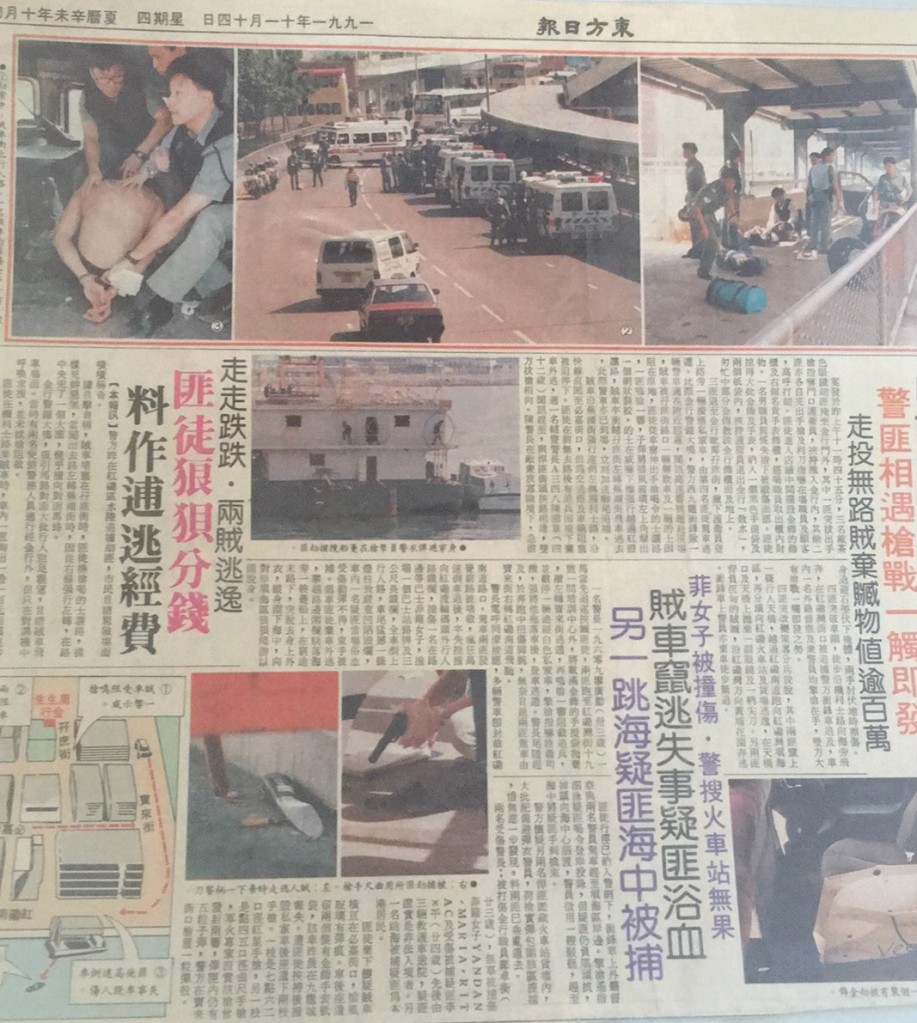
Chapter 1 – Cantonese and standing on one leg.
On the 18th of February 1987 I boarded the second aeroplane I had ever been on in my life, and took a one way flight from Heathrow to Hong Kong.
I was joined by nine other “expatriate” recruits, some of whom I had met over previous months during the Royal Hong Kong Police interviews and selection process at the Hong Kong Government offices in Grafton Street in London.
I was one of three former Metropolitan Police officers who had been successful in applying to join “Asia’s Finest”. Among our small intake was also a former Detective Sergeant from the Greater Manchester Police, a couple of former British Army officers, and the remainder were straight out of university.
Together with another 26 locally recruited Chinese officers from Hong Kong, including two ladies, Gloria and Geraldine, we were to form Probationary Inspectors’ course 306-308.
Given the horseplay and mayhem we caused on the 12 hour business class flight, mostly initiated by Gus, a former army officer, it was hard to believe that we represented the ten successful candidates out of many thousands of applicants.
As we approached Kai Tak airport we were all very excited and perhaps a little apprehensive about what lay ahead. We all gazed out of the windows in astonishment as the Cathay Pacific Boeing 747 seemed to squeeze between Lion Rock mountain and the densely populated high rises of Kowloon. The huge aeroplane, at seemingly low altitude, then performed a hard right hand bank for the final approach giving everyone on board an unnervingly close view of washing hanging out on poles from the densely populated Kowloon City apartments. It then skimmed over the roof of the infamous Walled City and landed on a thin ribbon of reclaimed land that stretched out into Hong Kong Harbour
As the aeroplane slowed and taxied back to the terminal buildings we inhaled our first whiffs of Hong Kong…. the pungent, and probably toxic fumes of Kai Tak nullah.
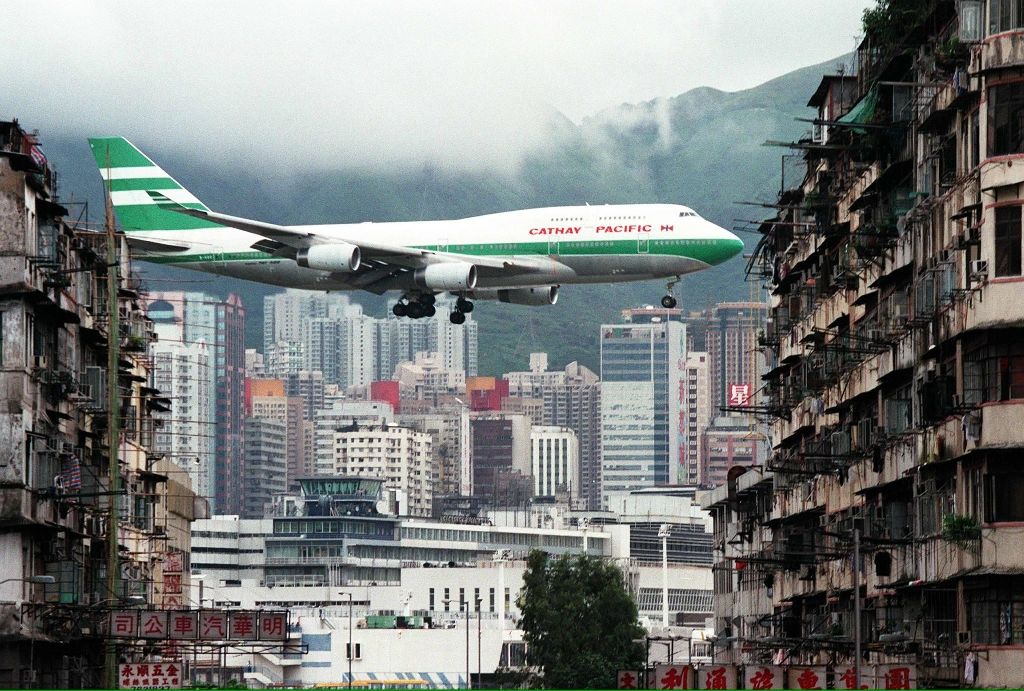
Waiting in the arrivals halls were our course instructors in full RHKP uniform, and grinning like a Cheshire Cat, our Drill & Musketry Instructor (“DMI”), Mr Cheung who would be responsible for our discipline, footdrill, and weapons training. He didn’t look like Gunnery Sergeant Hartman from the film of the same year, Full Metal Jacket, but we were to find out he could shout like him.
Dragging along my entire possessions in a suitcase, we were herded onto a bus and driven through the busy and completely alien looking streets of Kowloon, through the dark tunnel under the harbour, out into Causeway Bay with huge neon advertising signs adorning the sky scrappers, into the gloom and diesel fumes of Aberdeen tunnel, and then out again into the bright sunshine of Wong Chuk Hang where the Police Training School nestled in tropical greenery between Brick Hill, Ocean Park and some sinister looking tobacco factories.
We all noticed the huge Ocean Park seahorse, carved out from the jungle foliage on the hill above the training school, and discussed among ourselves whether we would be able to get into the amusement park, enjoy the many swimming pools and water flumes and ride in the cable cars. None of us noticed the steep steps under the cable cars.
In comings weeks we would get to know those steps very well.
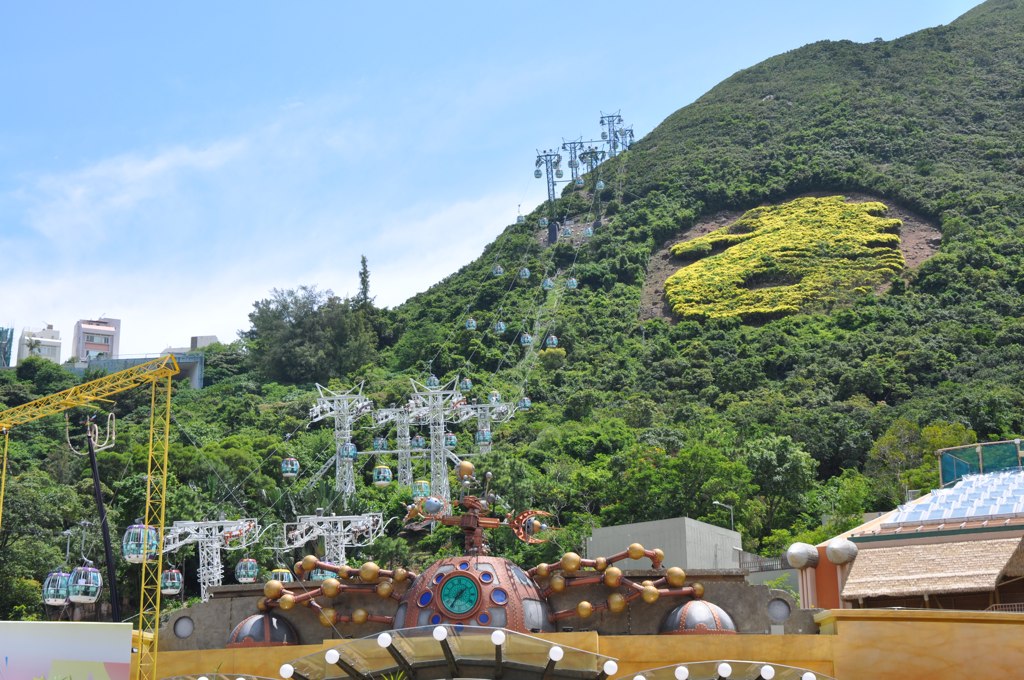
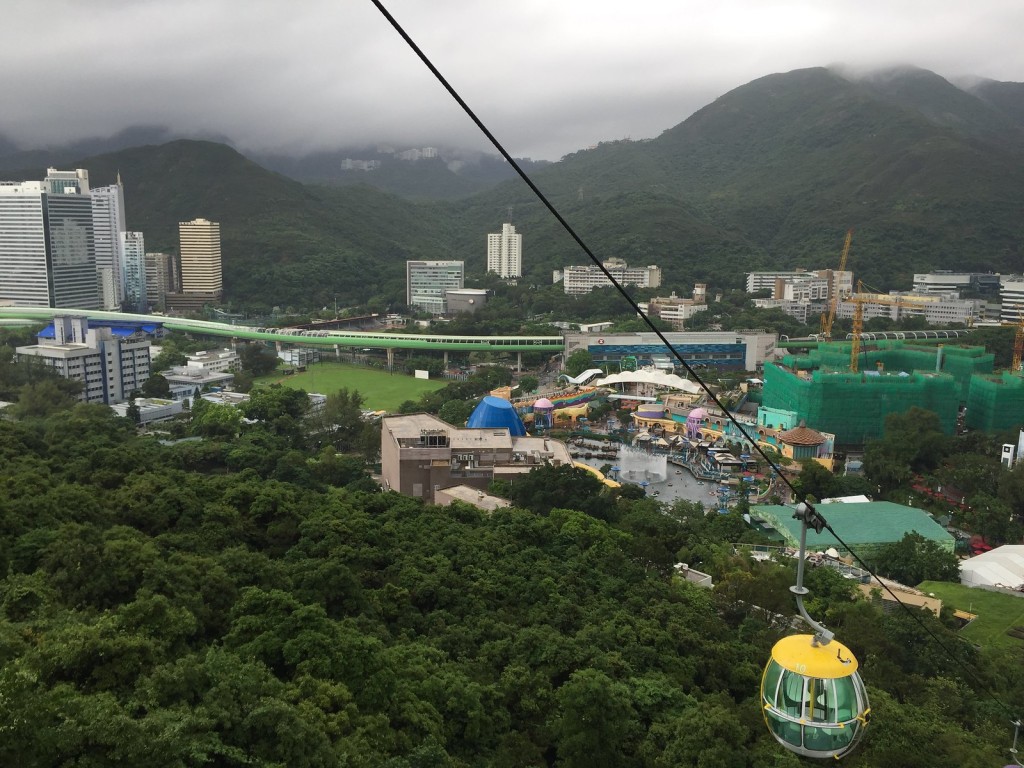
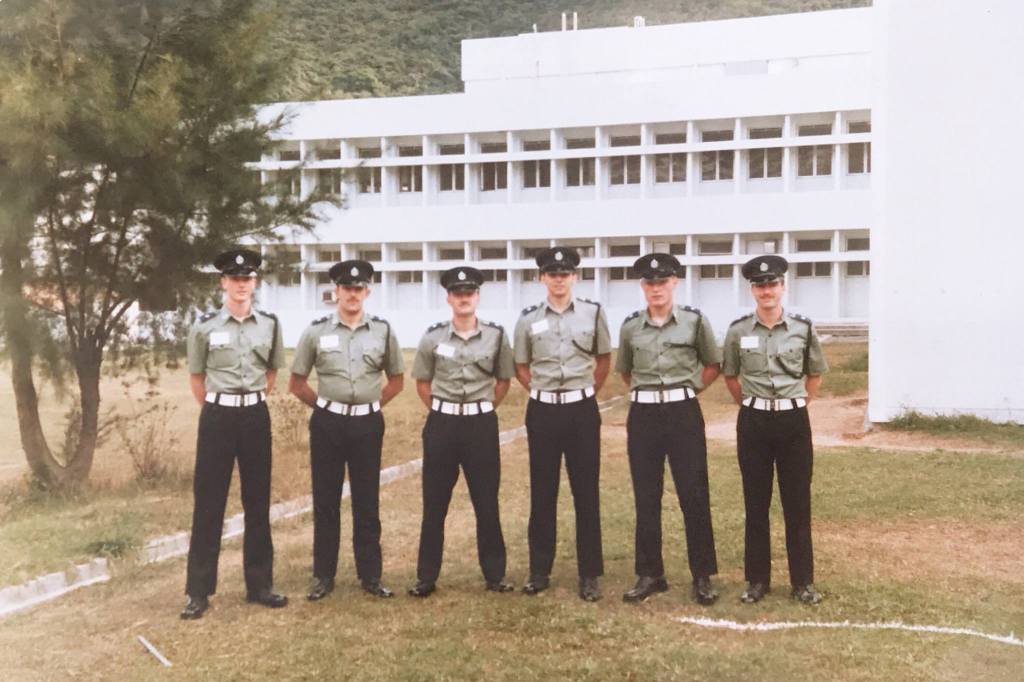

The 19th February 1987 was the official start of my Royal Hong Kong Police career and indeed my new life. The first five years of my adult life had been as a Constable in the Metropolitan police and was a mixed bag of disappointment, fleeting moments of success, long stretches of boredom, flashes of excitement and terror, toxic relationships, and always always being skint. I was ready to wipe the slate clean and start again. Do it better.
The 19th happened to be a Thursday and so we had a couple of days over the weekend to acclimatise to the weather and time zone until we were joined by the remainder of our intake who were all native Chinese officers from Hong Kong. Most recruited straight from university, but a few who had been promoted from the ranks of Police Constable or Sergeant.
As Probationary Inspectors (“PIs”) we were accommodated in military style dormitory barracks called “J’ Block for the junior stage of training. As we progressed through the ten months course our accommodation would improve slightly until by the senior stage we would have our own rooms in Heath House and a room boy to prepare our uniform and kit.
Ah Bat, the barber ensured all male officers received the uniform short back and sides, with sideburns no longer than the middle of our ears. Moustaches were still quite common in those days and I think Simon, Guy and Mike kept them throughout training, although an improperly trimmed “tache” was often an excuse to receive some kind of punishment from the DMI, as were unshaven cheeks, nostril hairs or bristle on the backs of our necks. Many Cantonese and southern Chinese men can’t grow full beards and often had miscreant “lucky” hairs sprouting from moles or “face fuzz” and so many were forced to shave for the first time in their life.
We all watched knowingly when a new recruit, and good friend of mine, called Rick arrived off the bus from the airport and entered the PTS Mess with 1980s blonde highlights in his hair. He managed about 12 hours before Ah Bat shaved the whole lot off and Rick was quite upset about this as he had spent quite a lot of money working on the Miami Vice look before he flew out from England.
Seniority of PIs under training was denoted by the colour of the backing flash under the “RHKP” badge on our epaulettes (blue, white, yellow) and in the junior stage I remember looking enviously at the senior stage PIs and wondering what we would have to go through before we were able to wear senior stage flashes .
We wore a cloth slide on our epaulettes, if indeed we wore shirts, or a wristband when bare chested, with our rank denoted by one British military star, and thus for our first three years of our service we were referred to as “one pip bombans”.

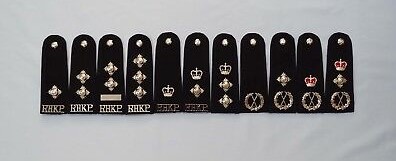
As was traditional, the intake above us was responsible for our familiarisation, i.e. a guided “piss up” of Hong Kong’s watering holes. They were also responsible for the de rigeur initiation ceremony that I remember involved Greg (aka “Pik” because he was South African) dressing up as a DMI, doing a room inspection in which all our kit and bedding was strewn about on the floor and “attempting” to get us marching on the drill square in our underwear.
This it turns out was far more sensible than the initiation ceremony we had planned for the intake below us when the time came that involved, among other silliness, buying a “snake” from a wet market, with the intention, when the time came, to release it into the “newbies” barracks. A week later, and much to everyone’s alarm, an extremely angry Chinese Cobra emerged from its bag inside Ben’s locker, shot off at alarming speed, hissing and terrorising everyone until being finally captured by the official police snake catcher, no doubt to be sent to the snake soup shop it was originally destined to go.
Our lame excuses to our instructors that the snake must have crawled in from the jungle, which wasn’t actually an uncommon occurrence, was treated with the skepticism it deserved. The snake recognition skills of the two former army officers responsible for the prank, and indeed all their other military escapades and stories of daring do were now and forever in doubt.
Our Hong Kong familiarisation involved a very pleasurable boat trip in a Sampan (a small traditional junk boat) from Aberdeen harbour near the training school and around the island in choppy waters to Wanchai where we all stripped off and jumped into the sea. Suffice to say, Hong Kong harbour in the 1980s was not the cleanest bathing spot, nor one of the safest being at the time the busiest harbour on the planet.
After this baptism, I immediately developed a painful ear infection, no doubt from the high concentration of turd bacteria, and this ear and throat infection flared up frequently, as jumping into the South China Sea, for some reason or another, seemed to be a common activity throughout our training. A surreal experience nonetheless floating in a shipping channel and being surrounded by the biggest and most spectacular display of neon lights and brightly coloured advertising awnings in the world.
Back on shore, we were later familiarised with the famous curries in Chung King Mansion on Kowloon side in which my lasting reputation was forged, and perhaps my nickname. The sequence of events involved, allegedly, me stealing a potato chip from Pik’s plate, being stabbed in the back of my hand by Pik’s fork, and rolling around the floor choking Pik in a headlock.
It is debatable whether this incident resulted in my nickname, “Max” as in Mad Max, for which many people still know me, or because when my course instructor, Ken, asked me, ‘What’s your name?’, I replied, ‘Rupert’, to which he replied, ‘That’s a stupid name’, resulting in fits of hysterical laughter from my squad mates who there and then christened me “Max”, as they insisted I looked like the MTV computer generated host, Max Headroom.
The nick name has stuck ever since and still used by my friends, although in recent years I have become known by the Chinese name the Hong Kong Government bestowed on me, 歐奕礼 (Au Yik Lai in Cantonese, or nowadays using the Mandarin pronunciation, Ou Yi Li that my “other half” Fanny and and other Chinese friends call me to this day).

https://images.app.goo.gl/6GaNeXU3mD8ZW5ZQ6
After the Pik stabbing incident, we were familiarised with nightclubs, San Miguel beer, Carlsberg beer, Wan Chai girlie bars, more nightclubs, strange creatures on kebab sticks, and dancing with Filipino Amahs to the hit songs from Madonna, Michael Jackson and a local tune called, “Louie Louie Louie” that was repeated over and over again. I remember little more about that night other than waking up choking and nearly drowning in a huge hot tub together with Gus at some massage parlour in North Point at about 3am the next morning.
All in all, a very successful familiarisation to the Fragrant Harbour.
Hong Kong has a subtropical climate and has four distinct seasons. A cool and dry Winter, a humid and sticky Spring, a very hot and stormy Summer, and a pleasant, dry and sunny Autumn. When we arrived in February it was late winter and so the uniform we were issued with was dark blue trousers, a khaki green shirt, a blue navy style sweater, DMS boots and a flat dark blue cap with the RHKP badge.
As students we always wore white webbing belts that would constantly be wet and soggy from continual sweat. Often, the white blanco would smear all over our shorts or trousers and inevitably give the DMI some excuse to “gate” us (i.e. confined us to the school grounds on Saturday afternoons and Sundays to perform extra drill and perform mundane tasks).
As the cool weather in Hong Kong lasts for only about six weeks we soon changed out of winter uniform to the summer uniform of baggy khaki shorts, much like the uniform worn in the TV comedy, It Ain’t half Hot and so we were bare chested when outside for lessons such as tactics, foot drill, and weapon training. In the classrooms and Officers’ Mess we wore a khaki green shirt with a lanyard, whistle and mandatory notebook in our breast pocket. For leadership training we wore military style jungle kit, jungle boots and a blue jungle hat that took us, invariably, into the hot, steamy, spikey, mosquito infested jungles to get lost with a map and compass.
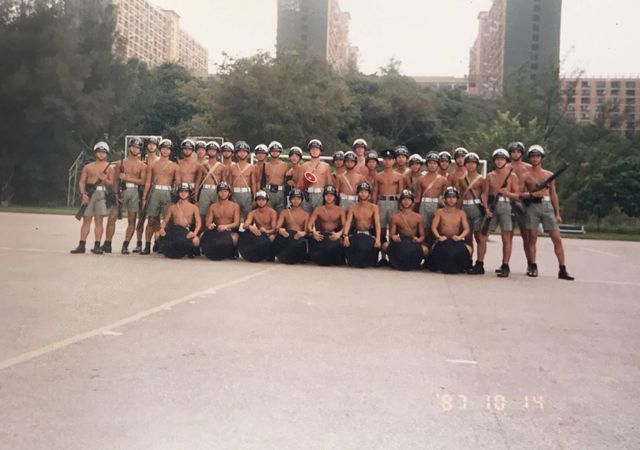
Geographically, Hong Kong is a collection of islands (Hong Kong, Lantau and many smaller islands ending in the word “Chau”) and a part of mainland China (Kowloon and the New Territories) on the southern coast. The territory is located to the south east of the Pearl River Delta in Guangdong province, so the prevailing language is Cantonese, although government, administration and the documentation of the civil service in those days was in English.
Historically, The Qing dynasty ceded Hong Kong in perpetuity to the British Empire in 1842 through the treaty of Nanjing, ending the First Opium War. Hong Kong then became a British crown colony.[2] Britain also won the Second Opium War, forcing the Qing Empire to cede Kowloon in 1860, while leasing the New Territories for 99 years from 1898. (source: https://en.wikipedia.org/wiki/History_of_Hong_Kong).
So what did we do for that 10 months of training before we passed out and were thrust onto the streets of Hong Kong?
For the first eight weeks of training all expatriate officers had to undertake and pass the Basic Cantonese Language course. A language, I should note, that is notoriously difficult to learn and has at least seven tones, if not nine, so that gau, gau gau, gau, gau and gaau could mean nine, rubber, glue, dog, penis and enough…if not many other meanings. Without using the correct tone asking to stroke someone’s dog could have unexpected consequences!
Within my course we had Simon, a Mancunian with a nuff nuff monotone northern accent who tried really hard, and to this day, despite being married to a Cantonese woman for nearly four decades, still cannot pronounce anything in any Chinese dialect. On the other hand, Gus, a well spoken public school educated former army officer, a mimic, comedian, musician, bullshitter of note, and far too clever for his own good was a duck to water, quickly mastering the language and indeed every swear word and profanity, of which there are surprisingly many.
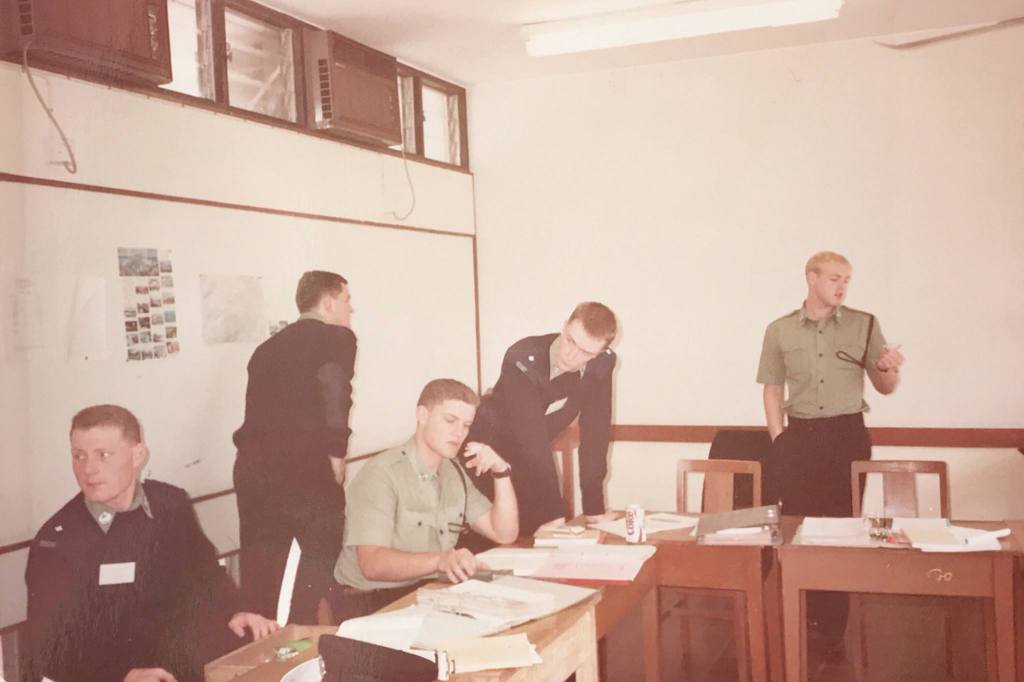
For me, I came somewhere in the middle with my Cantonese ability. It is only now, being reasonably fluent in Mandarin, that I realise what my main problem with the Cantonese dialect actually is. I just don’t like it. To my mind it’s an ugly sounding, unnecessarily loud and vulgar dialect and the sooner everyone speaks Mandarin the better. This is, of course, a very contentious point of view, and will undoubtedly warrant rebuke from, well, Cantonese people. Still its my blog. My point of view.
As an ethnic minority in a foreign country, albeit a colonialist, I encountered quite a bit of racism, in both directions, I might add. Much of this racism was disguised or camouflaged due to the language and cultural barriers, but became increasingly apparent as our Cantonese ability improved and we realised what a lot of local people were actually saying. In Hong Kong the racial slur “gwailo” (鬼佬 – ghost guy) is often, if not always used to refer to a Westerner or European looking person. As for derogatory terms for Filipinos, Indians and Africans? Don’t ask. I always joke that for the first year of my life in Hong Kong I thought, “sei gwailo” (die foreign devil) meant “Good Morning”!
Back then in those colonial days it was a bit of “them and us” and the British system in many ways discriminated against local Chinese and so there was an underlying resentment towards the foreign colonial power that surfaced from time to time. Ironically, nowadays many older Chinese look back fondly to the colonial days. The younger generation who foolishly wave the British Hong Kong flag in defiance against communist China never actually experienced colonial Hong Kong and seem oblivious to the fact that democratic Britain never bestowed any democracy whatsoever on Hong Kong during its rule and in actual fact exercised a sort of apartheid for more than 150 years.
If the tables were turned and I joined the Isle of Wight Police Force on the southern coast of England and it was run by the Chinese and I was forced to speak Cantonese and eat chickens feet for breakfast I may also be a bit “hak hau hak min” .
Anyway, while we were struggling with guangdong wah, local Hong Kong officers were sent off to do a course that was also outside their comfort zone. The Police Adventure Training Course. A sort of outward bounds cum Duke of Edinburgh Awards course that had the locals going off into the wilds to pitch tents, make fires, paddle canoes, read maps and try to make a decision that does not involve several hours of bickering, changing their minds and collective faffing about. Later, these skills would help them with the one course they usually did quite poorly in as they were unable to rote learn how to do it from a training manual. Leadership!
It is not untrue to say that the vast majority of Hong Kong Chinese spent their entire youth rote learning “stuff” and regurgitating this “stuff” in the many examinations they had to endure. Climbing trees, riding bikes and messing about in rivers was alien to many of my local colleagues. The stereotypical Chinese student who was good at mathematics and could analyse Hang Seng Index trends, but could not tie a knot or think laterally was very much the norm back in those days.
There were a few Chinese officers who were educated overseas in the UK, America, Canada or Australia, but most had been through the Hong Kong education system that seemed to have the effect of erasing all initiative, creativity and individual thinking. That’s not to say they didn’t work hard. They work extremely hard which is why Hong Kong is so successful and I believe always will be.
However, back in the 1980s, it seemed that Rudyard Kipling’s East is East and West is West and never the twain shall meet was never so true.
We were of course thrust together for all other aspects of training and lived cheek by jowl in the barrack dormitories. As our Cantonese ability was none existent, we conversed in Chinglish, a sort of pidgin English with Chinese characteristics. One of the things that the local Chinese officers were keen to talk about and share was their cuisine and I remember the joy and excitement of getting to know and try “real” Cantonese food and delicacies. The vast majority I love, especially Dim Sum, Dai Pai Dong dishes, Asian vegetables, Cha Siu pork, Chinese soups and curries. There are still a few things I steer well clear of, such as feet and innards, animals normally considered as pets, and especially locally harvested seafood that swim slower than I do!
Coming from England and not being as worldly travelled as I am today, I did find my Chinese colleagues a bit odd, in the sense that mundane things like washing habits, bodily noises, and table manners were “odd”. For instance, the locals always wore enormous baggy Y front underpants and flip flops in the shower, always carried a flannel to the “heads” like a wine waiter carries a napkin, and despite hot and cold water pouring out of the showerhead as effectively as anywhere else, always brought in a plastic bucket into the shower cubicle with a plastic cup!! The hacking phlegm dawn chorus was something to behold, as were the flip flop marks on every single lavatory seat, because the majority of Chinese squat on top of the seat for a poo rather than sit down like Westerners do.
Another cultural difference back in the 1970s and 80s was that you rarely saw Chinese engaging in outdoor activities or hiking about in the country parks and countryside, except the few Hakka and Tanka villagers going about their rural life, or indeed illegal immigrants who had swum over from China and had got lost.
This of course all changed at the end of the 1990s and Hong Kong people suddenly discovered the great outdoors, multi coloured lycra, yoga pants, and exciting toys to play with such as mountain bikes and surfboards. This outdoors revolution, some would say, was brought about because Chicken flu, Swine fever and the SARs epidemics scared the shit out of the local populace and breathing fresh air and mucking about in the great outdoors was no longer seen as some daft thing that gwailos did at the weekends.
The Officers’ Mess was a regular haunt, mainly due to the lure of beer and pies. Although I have never been in the military, the RHKP Mess traditions and customs, I am told, were fairly similar to the those in the British Army. At least very similar to all the colonial police forces around the world during the British Empire.
Every Officers’ Mess I ever went to back then seemed to have some former Rhodesian or Palestine Police “old boy”, dressed in a safari suit propping up the bar, much like the Major character in Fawlty Towers. The walls were always adorned with pictures of the Queen, Royal visitors, military and police plaques from guests, sepia pictures of colonial police stations, tiger hunting parties, and police units and sports teams from long ago.
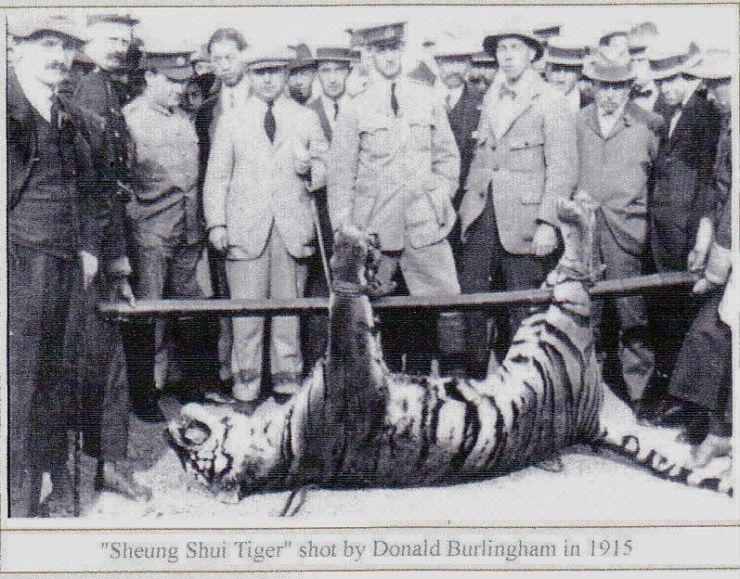
There were rules about what items of uniform could be worn inside, rules about civilian attire, and written threats of bad things that will happen if you didn’t sign your Mess chit. Settling this bar bill seemed to take a good chunk out of our salaries at the end of the month and so with our weekend jaunts into the neon wonderlands of the “Wanch” we all seemed to save very little money. This contrasted with my training at Hendon Police College in 1982 where everything was free and I managed to save nearly all my salary which I used to buy my first car after we passed out.
We regularly dressed up in Mess kit for formal dinners and dining in new intakes. Like the UK military, there were lots of toasts to everyone, traditions such a female guests kissing the regimental duck that was paraded on top of the tables by the “Duck Major”, cigars, port, after dinner speeches and organised hooliganism such as Mess games.
Wednesday was curry lunch day and I had to endure Gus burping Vindaloo into my face all afternoon, and only English food was served in the Mess except for a once a month Chinese special that none of the locals thought very much of. Hong Kong has a tradition for superb curries because of the Indian and Nepalese communities, not least the Ghurkha Regiments that were stationed throughout Hong Kong and the Sikh officers who served in the police at the beginning of the last Century.
Whilst we were learning to use chopsticks and the etiquette required at a Chinese dinner table, the locals were battling with knives and forks. Many expatriate PIs vividly remember seeing their first Chinese officer lifting a whole fried egg off their plate with a knife and with a lot of slurping levitating it into the air and into their mouths.
Also, since having travelled to every province of China on my global wanderings and somewhat of an expert in gorging myself with all kinds of Chinese food, I now understand why Shepherd’s Pie, Beef Wellington and Cod and Chips might have been a culture shock to my local squad mates. In fact, Chinese food in China is not like Chinese food from the Happy Dragon or the Ho Li Fuk Takeaway in the West and is far more varied and delicious. You will never see a fortune cookie, Chicken Chow Mein or Emperor Pao’s Chicken.
The Officer’s Mess menu also explains why our Chinese colleagues couldn’t get out of PTS fast enough on Saturday afternoons.
They were all starving hungry.
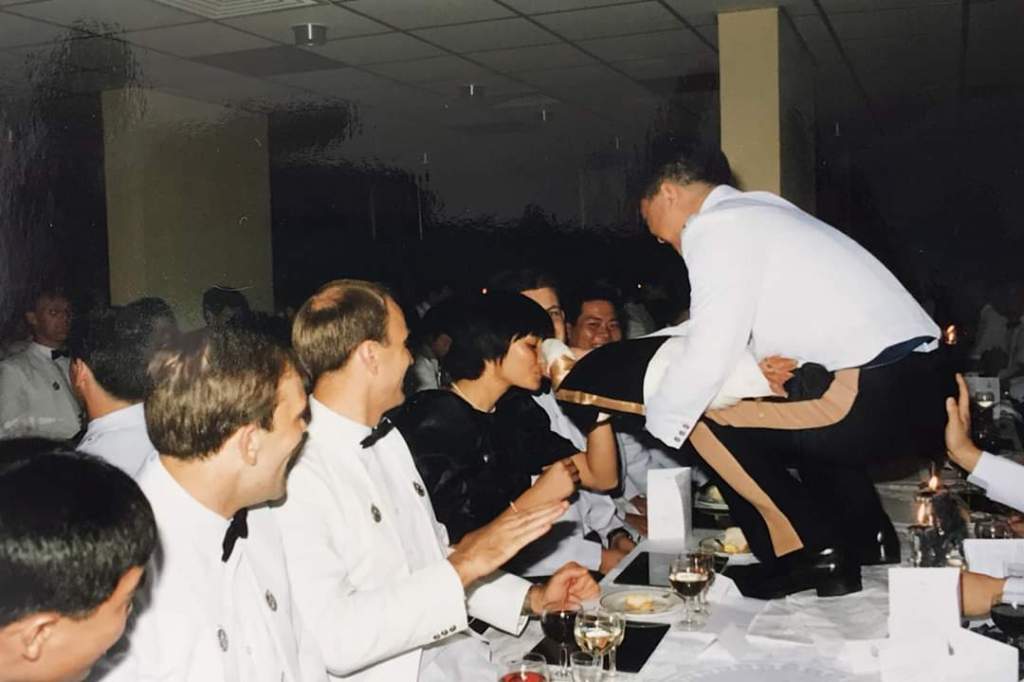

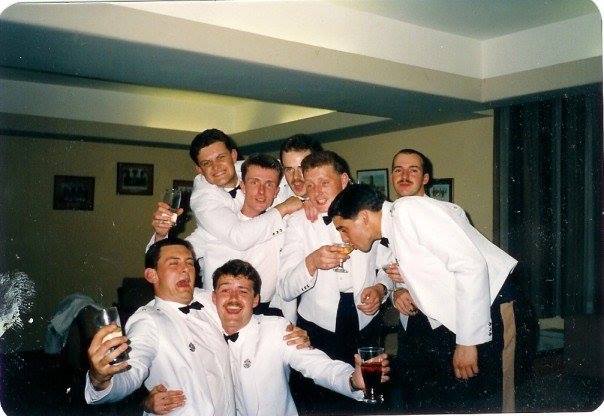
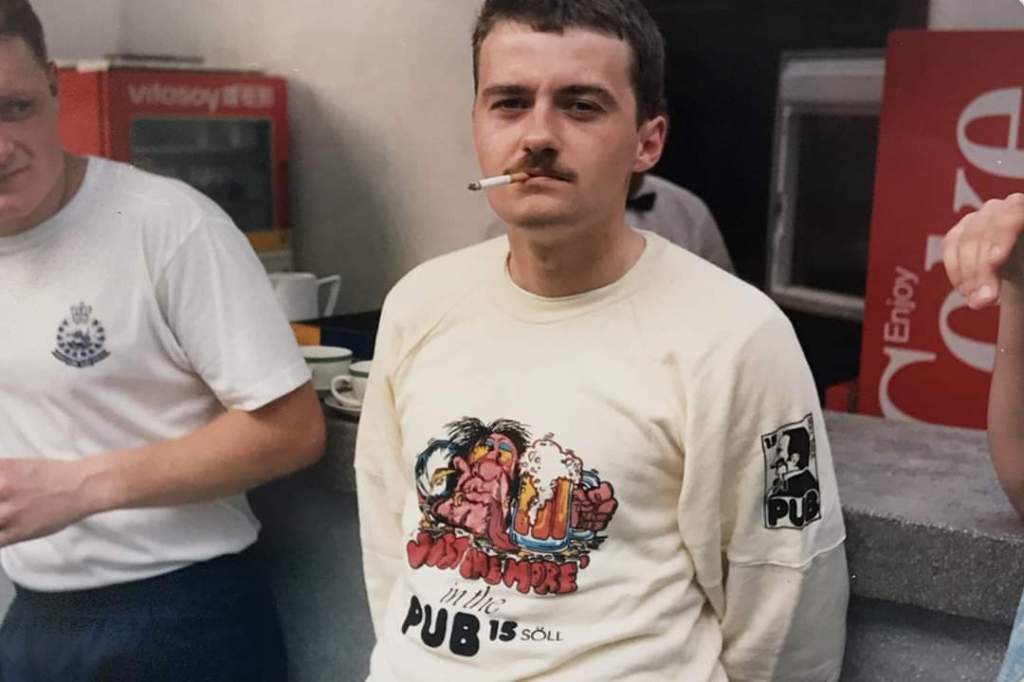
Although I did learn some foot drill at Hendon Police College in London, it was limited to marching in a straight line, trying to halt together and turning right in readiness for our simple passing out ceremony.
In the Royal Hong Kong Police foot drill was of an extremely high standard, the drill square dominated the police training school and we would have early morning parades and drill lessons everyday. We spent more time standing on one leg than flamingos do in the Ngorongoro Crater. Tram lines were grooved into the tarmac by generations of police recruits stomping up and down to the sound of British military marching music provided by the world famous, and world travelled RHKP band with their brass and bagpipes sections, resplendent in tartan uniforms.
The insults from our Drill and Musketry Instructor, Mr Cheung during drill lesson were hilarious, not least because he usually mispronounced his English and had a very stereotype and Benny Hill type accent.
Missa Urry (me) you so tellible. Mat Ye Lai Ga… noz hairs, velly red, velly hairy, velly sweaty? Missa Lucas Aerospace why you look li thaa? You are disgwace to fworce. You so tellible. Missa Holaspooky waah you stand li thaa? Are you something strange? Missa Chan. You are fworce entwy you shoo no better than expat… DISGWACE DISGWACE. SQUAAAAD 1, AS YOU WERE. AS YOU WERE. DOH BEND KNEE. YOU ALL TELLIBLE.


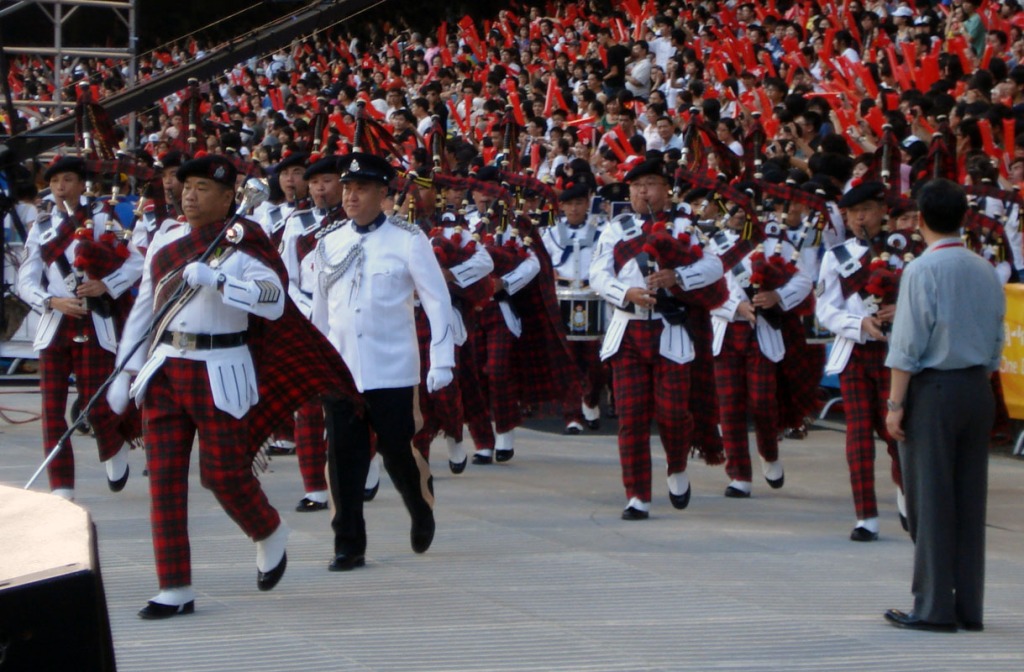
When in uniform we had to march around the school in pairs or squad formation, so that if you wanted to go somewhere you had to find someone going in the same direction. All this discipline was aimed at turning us from lily-livered civilians into well disciplined officers, and all under the ever watchful eyes of the DMIs and the formidable and very well respected Chief Drill & Musketry Instructor and former Scots Guards RSM, Willy Fullerton.
Foot drill was universally disliked by most recruits, apart from some oddballs like myself. It was uncomfortable and tiring for sure, especially standing out on the drill square in the scorching sun and stiflingly hot tarmac, discreetly shifting from foot to foot like an Australian desert lizard, but I found it all quite enjoyable and therapeutic. Mastering the commands and drill movements was like mastering a martial art. I also liked the music and all the pomp and ceremony. I especially liked being outside, but being bare chested all the time meant my light pink Anglo Saxon skin burnt easily under the scorching sun. A body evolved and designed for temperate west European climes, not out in the midday sun with mad dogs and other Englishmen.
The academic side was quite demanding for Inspectors, especially the Chinese Inspectors who had to pass the frequent and rather stressful examinations in English. I worked hard on my studies and usually put in two or three hours study every night, and perhaps more just before examinations and usually came in the top two of the class. It was helped by the fact that Hong Kong law is very similar to UK law and I had studied much of it before in the Metropolitan Police where I also did reasonably well. To this day, I can still recite most sections of criminal law and the Hong Kong Law Ordinances pretty much verbatim.
However, there were other strange and rather alien laws specific to Hong Kong that we had to learn, such as laws relating to street hawkers, prostitution, gambling, dog meat, bans on homosexuality in the government and civil service (illegal in those days), corporal punishment for possession of offensive weapons, laws relating to triad organisations and of course anti corruption laws, which was pervasive in the Hong Kong Police and the disciplined services (Fire, Customs, Immigration, Correctional Services), Civil Service and other Government Departments in the 1950s, 60s and 70s. Drink driving laws were less strict than the UK at the time, the excuse given that Chinese didn’t drink! That did change in coming years with the introduction of alcohol breath testing equipment and associated laws in 1990s. It appeared Chinese did drink and drive after all.
The most painfully dull material to learn was undoubtedly the contents of a heavy tome called Police General Orders which were about procedure, discipline, and to my mind very colonial and outdated.
Weapons training was something new to me and to start with I struggled to do well. It was not until I received individual firearms training from a very competent instructor called Clive at Police Tactical Unit in Fanling a few years later that I mastered the marksmanship principles and started getting decent groupings on the targets. To this date I am a pretty good shot, and indeed I needed to be later on in my police career when I would occasionally be on the wrong side of an AK47.
We would go to the outdoor ranges for Colt AR15 rifle, Remington 870 shotgun and revolver training, and there was an indoor range to simulate more realistic “shoot – don’t shoot” scenarios.
At first we used Colt Police Positive revolvers and I swear you could see the bullet coming out of the barrel and lob in an arc towards the target, that is if the cartridge ignited and the bullet didn’t get stuck in the barrel. Later during our training the standard firearm was changed to the .38 Smith and Wesson Model 10 revolver, one of the most common police sidearms in the day.

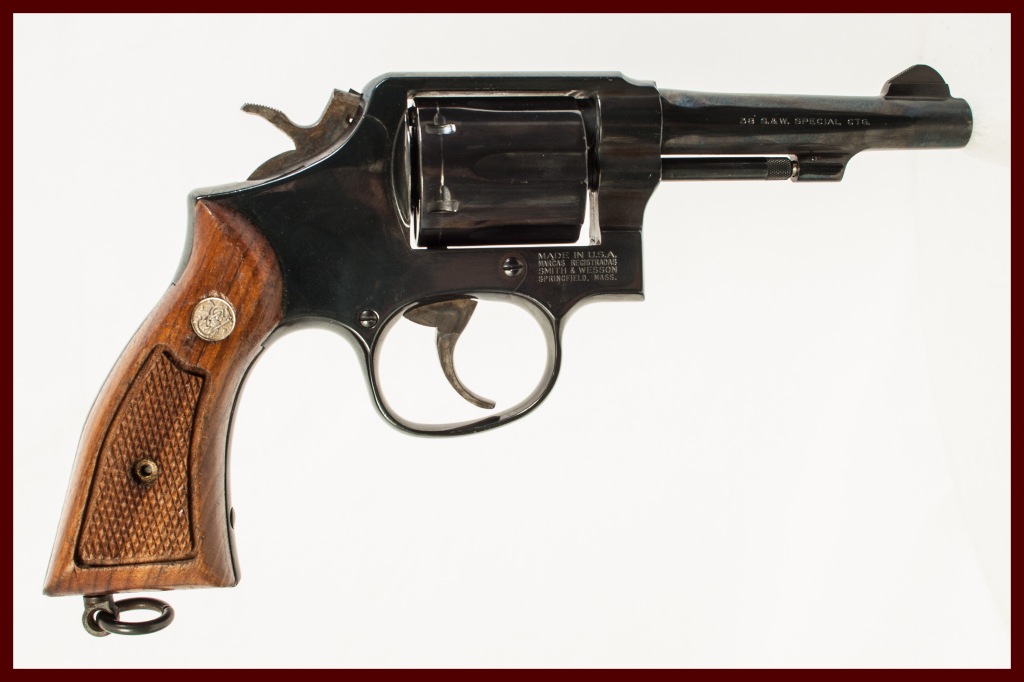

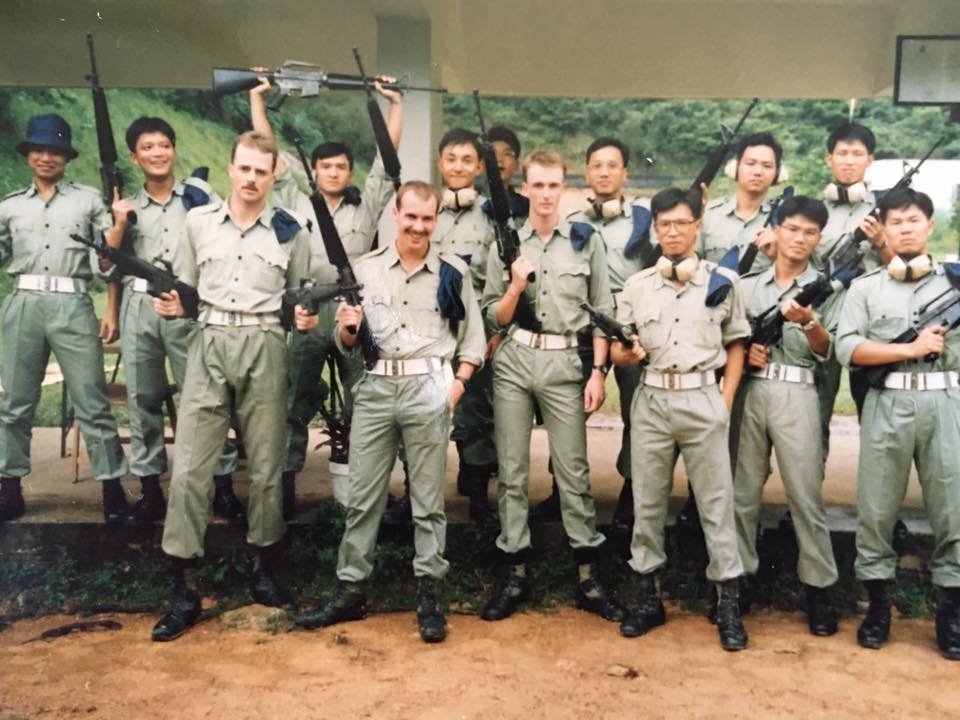
I wasn’t the worst shot, some recruits were terrible, and to get through the range course examinations some of the better shots would sacrifice a couple of rounds and fire into their “squad mates” adjacent target to get them through.
In the early days of my RHKP career female officers were not armed and were not allowed into specialist units like Emergency Unit, Police Tactical Unit, Explosive Ordnance Disposal and the counter terrorist unit, SDU.
In 1995 when I was myself an instructor at the training school ( a cushy posting I applied for so I could study for my degree) I had the first intake of females who were weapons trained, and with mixed results. One of my WPIs called Samantha was a very slight framed female, even by the slight build of most Cantonese women, and could not for the life of her pull the trigger, and, to the horror of firearms training staff, repeatedly used two index fingers to yank at the trigger. Stray rounds flying off towards the densely populated Wong Chuk Hang estate would normally be an excuse for dismissal, so this resulted in several staff meetings to discuss what to do with her and what remedial action could be taken. This was the beginnings of the political correctness and inclusivity versus meritocracy and ability.
In the end we decided that Samantha was just going to have to strengthen her fingers or leave the course regardless of mandates from upon high, and to her credit she spent several months wandering around squeezing a hand strengthening device and eventually was able to pull the trigger with one finger, although I will admit I did see her use two fingers for the final qualifying examinations that got her through. I have no idea if she actually ever had to use a revolver in anger during her police career. The vast majority of police officers never do.
Over the following years females entered all the front line tactical and specialist units, including Explosive Ordinance Disposal (“EOD”) where it was decided that if a female officer, or indeed a male officer, can operate inside a 90 kilogram EOD bomb suit in 35 degrees centigrade heat and 100% humidity then she or he can apply for the unit. After all, its not getting down to the IED in the bomb suit that is so hard, its getting back up again and making a purposeful retreat on two legs back to the command post. However, you cannot get away from the fact that there are certain jobs in the police that require above average strength and physical fitness. If a woman can do it, fine, but I remain of the view that lowering standards and making exceptions is wrong just to “tick” the woke box. I think I am vindicated in this view when I witnessed “some” female officers serving in Police Tactical Unit struggling and having to be “covered” by their male colleagues during the violence of the anti China riots in 2019.
We also had leadership training that was to my mind, and indeed to most of the other expatriates’, like a day off hiking in the jungles, messing about in helicopters and speed boats, seafood lunches and 7 Up (“chat hei”) that tasted remarkably like beer! We practiced role playing scenarios such as setting up cordons, ambushes, raiding drugs and vice establishments and so forth. We learned how to structure orders and give commands using the GSMEAC (Ground, Situation, Mission, Execution, Administration and Logistics, Command and Signals) operational order and briefing format that I still use today for all my fraud investigations engagements. The Romans used it, the British Army use it, and so do the Hong Kong Police. Its logical and it makes sense.
Often we were ferried about Hong Kong by helicopter which I thought was enormous fun. Sometimes in a red and white Royal Auxiliary Air Force Aerospatiale helicopter and sometimes in the RAF Wessex helicopters that were built in the 1950s and 60s. I had never been in a helicopter before and thoroughly enjoyed flying in them, sometimes, during more serious exercises and operations, at ground hugging mountain contour heights.
Later in my career I would use helicopters to green rope into the Close Quarter Battle Range (CQBR) for training, on to the top of high rise buildings under construction during operations to arrests Illegal Immigrants, or onto container ships far out in the South China sea for counter terrorist exercises.
The RAF pilots were amazing. I am in awe at their skill.

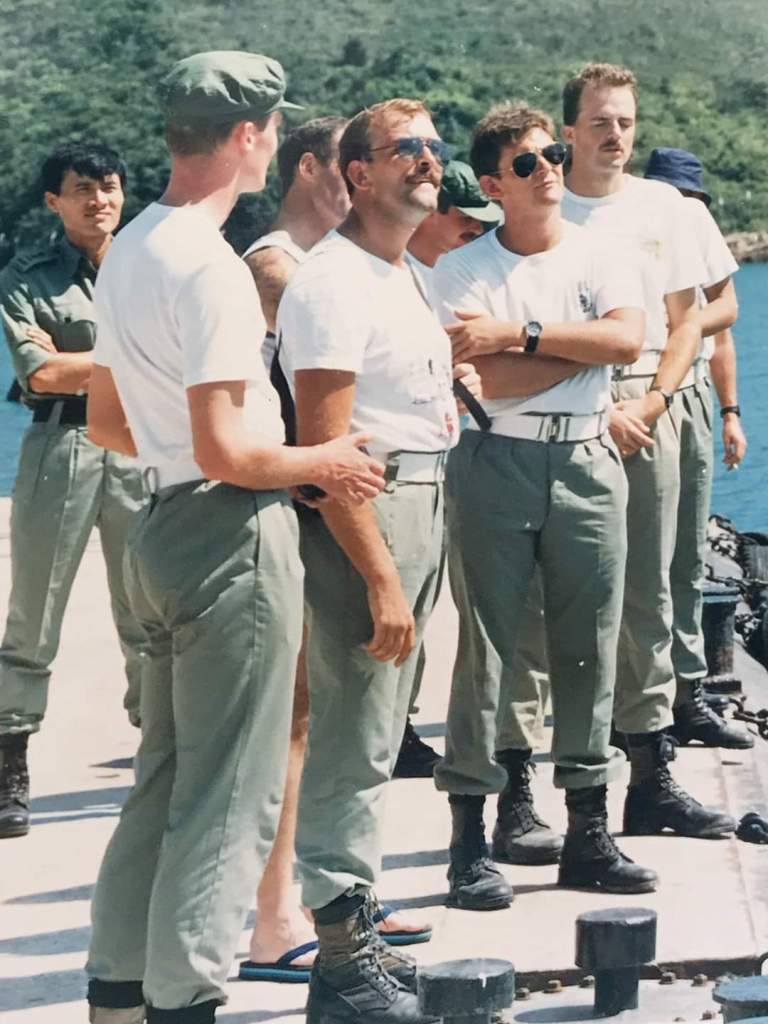
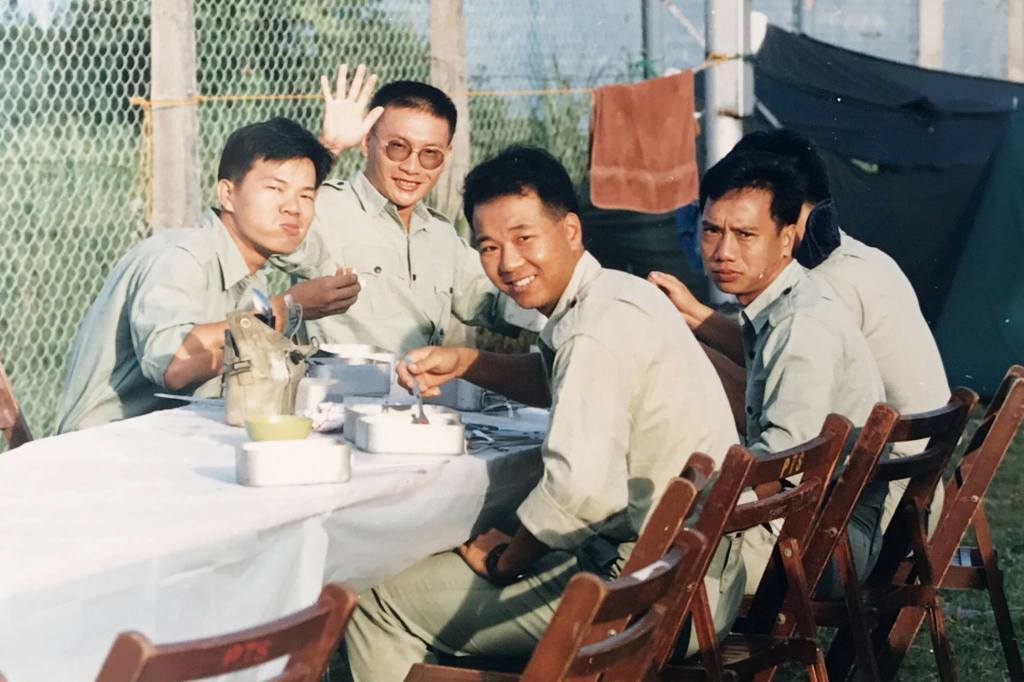
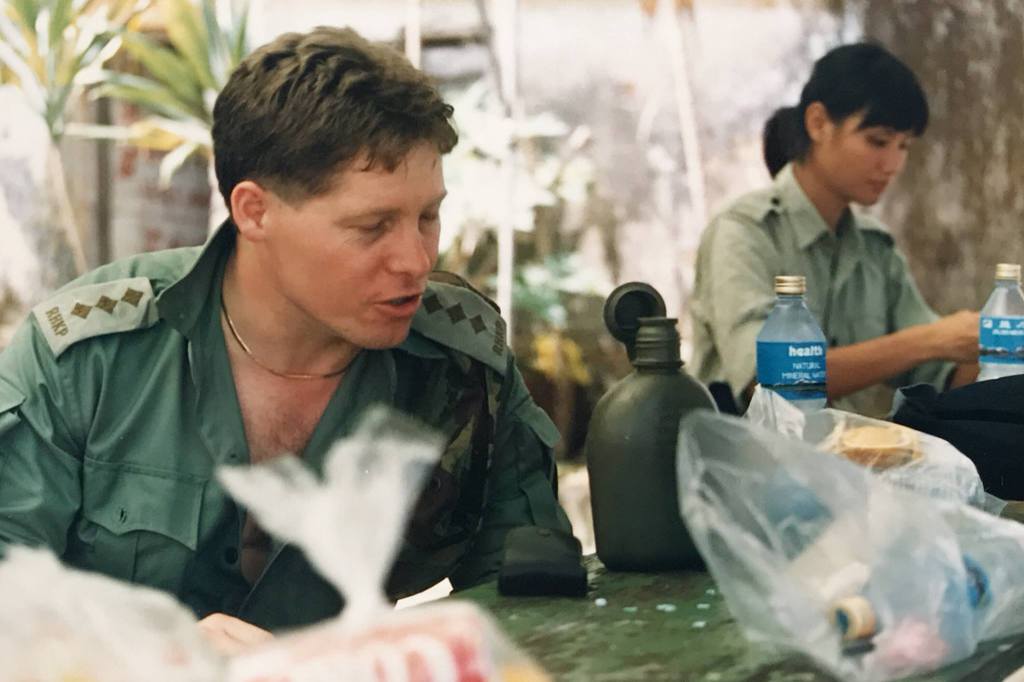
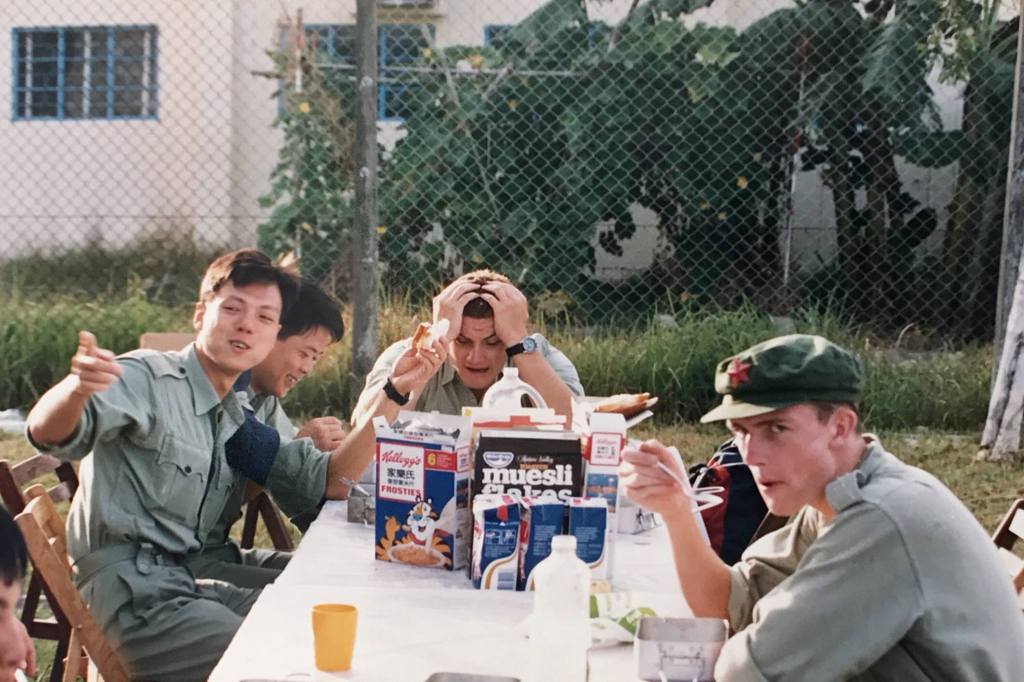

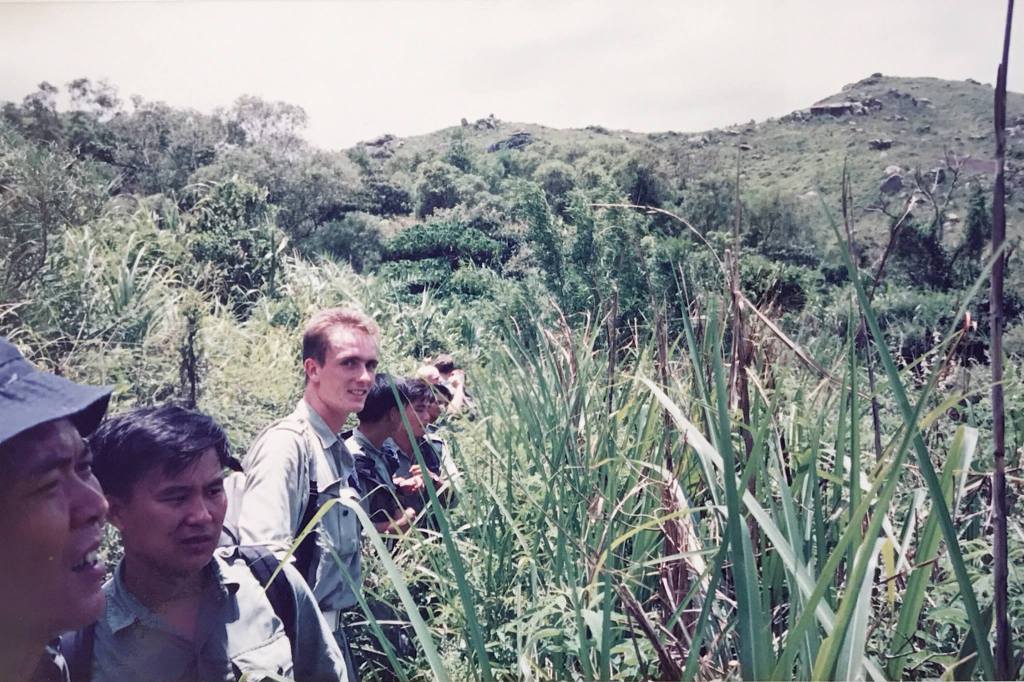
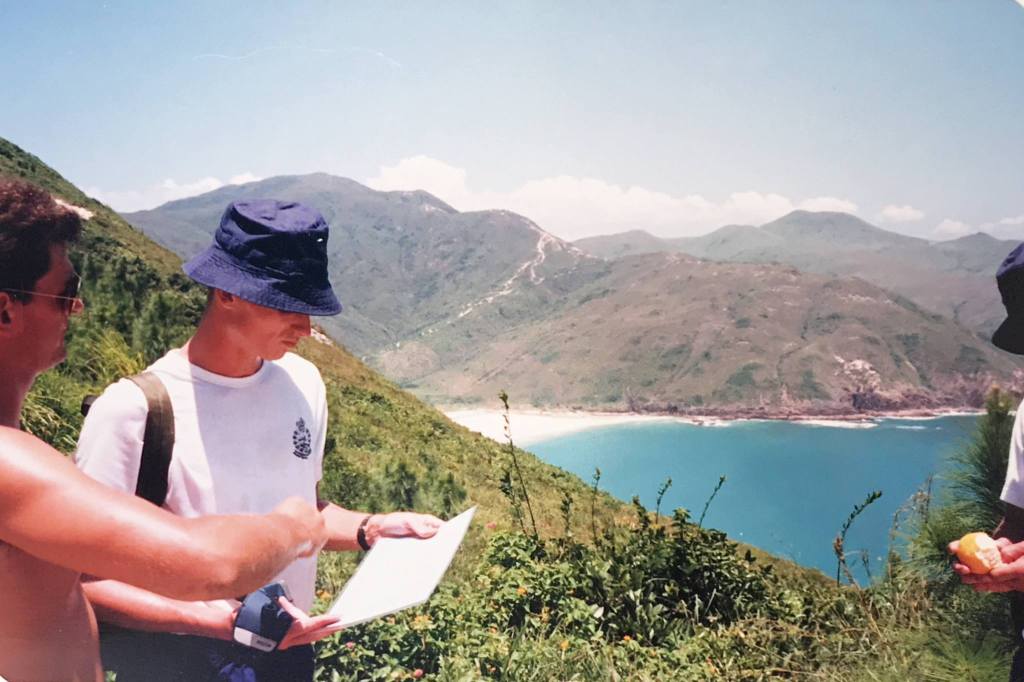
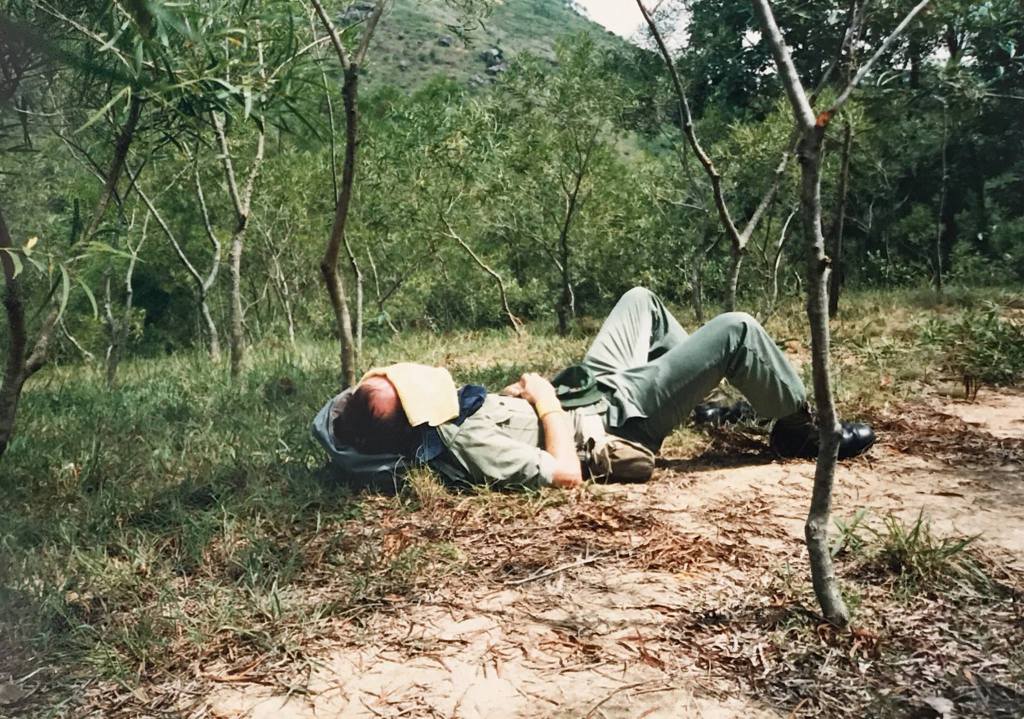
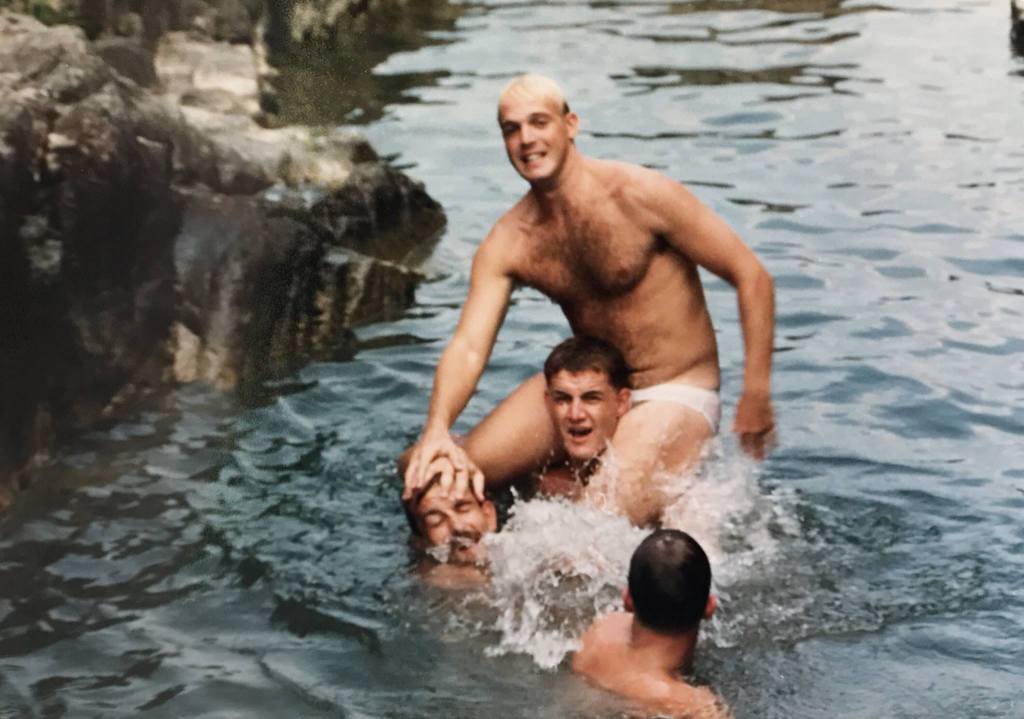

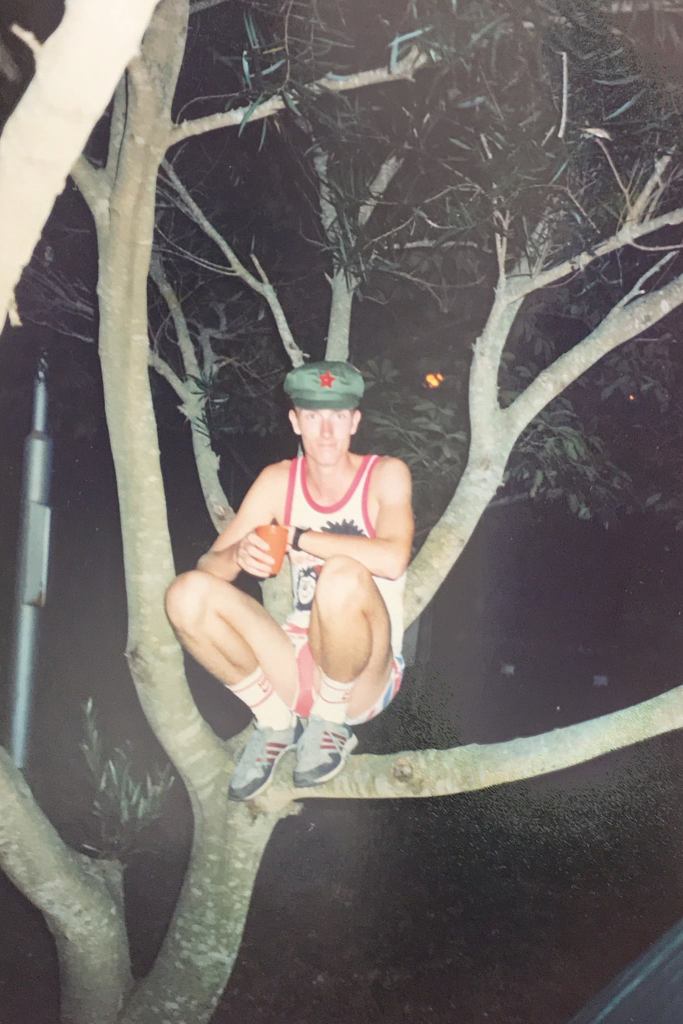
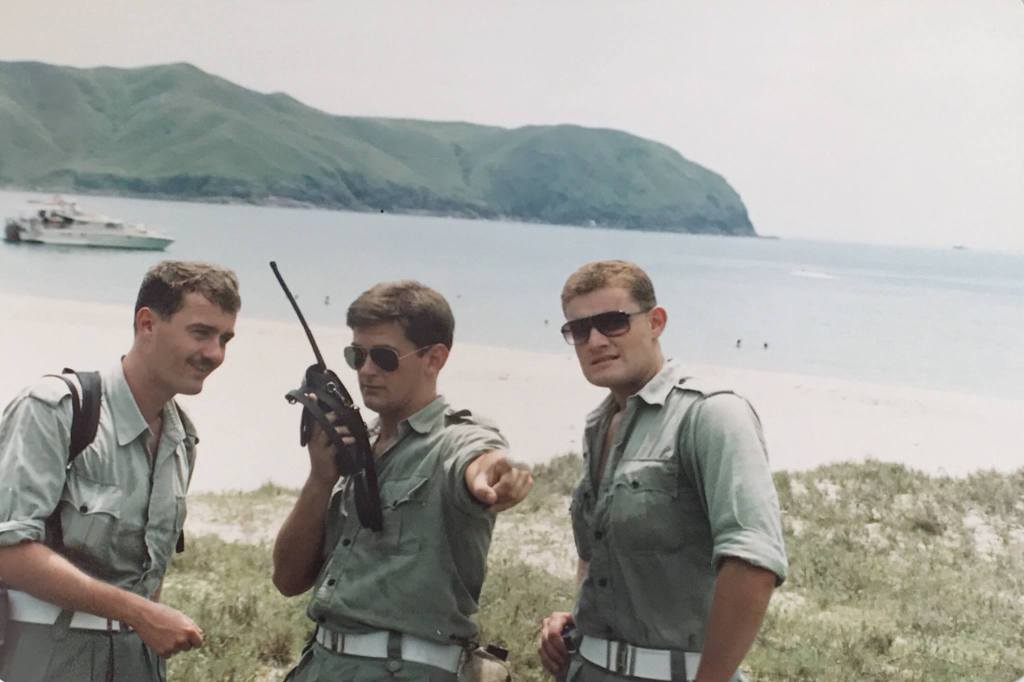
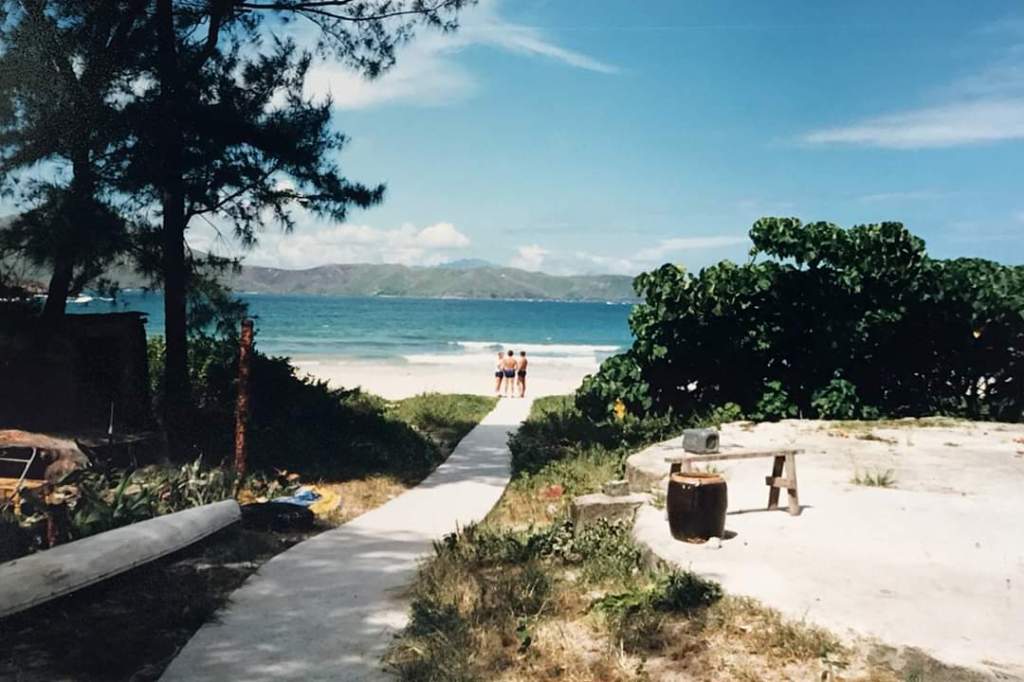
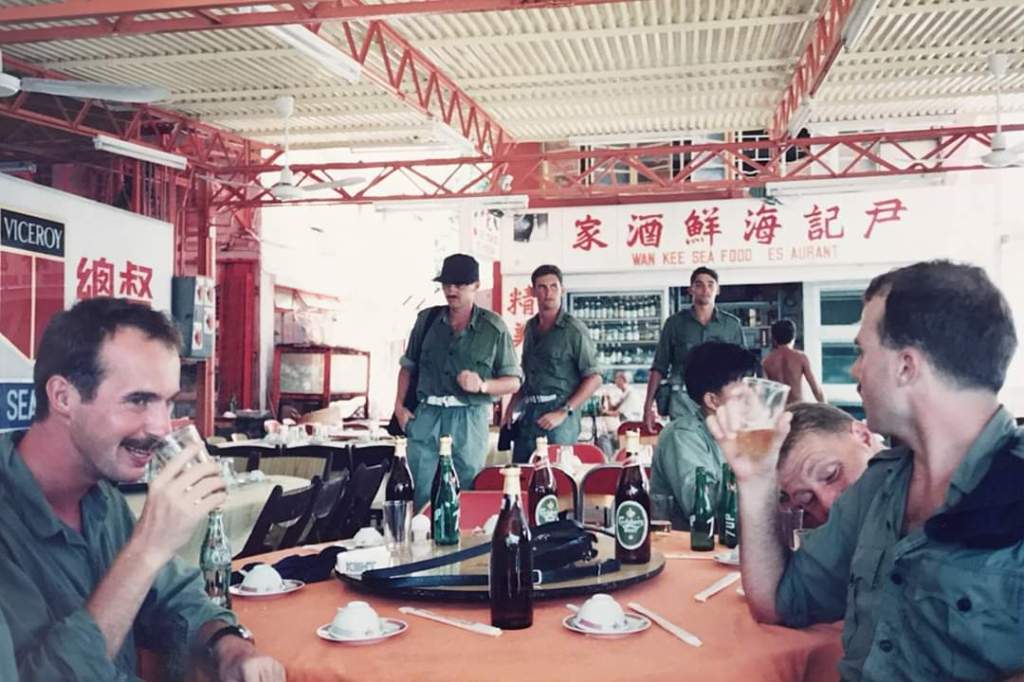

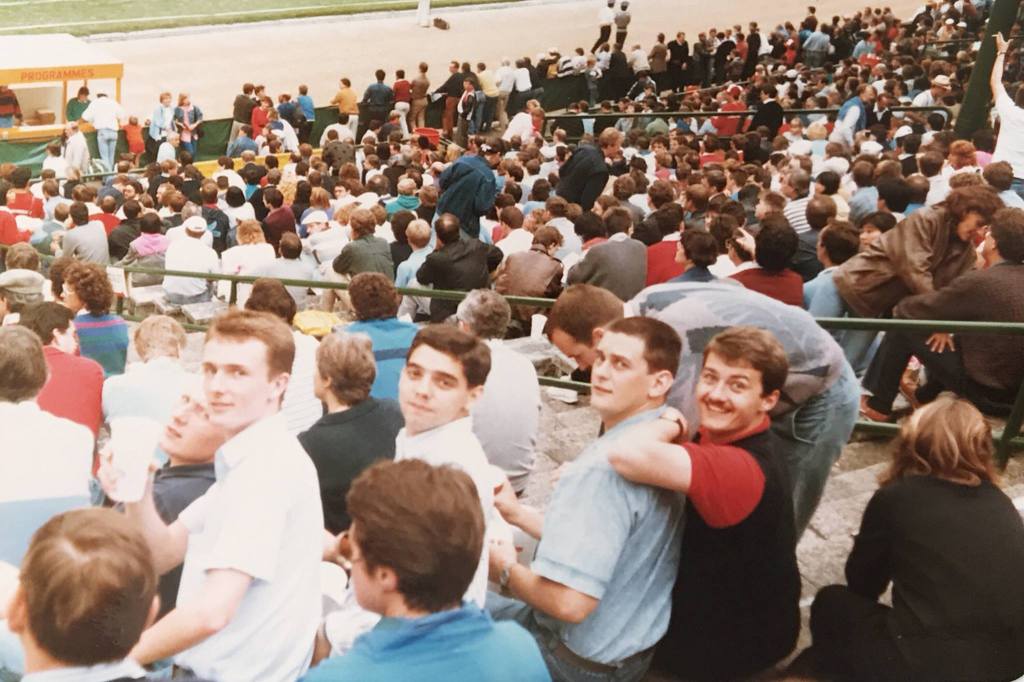
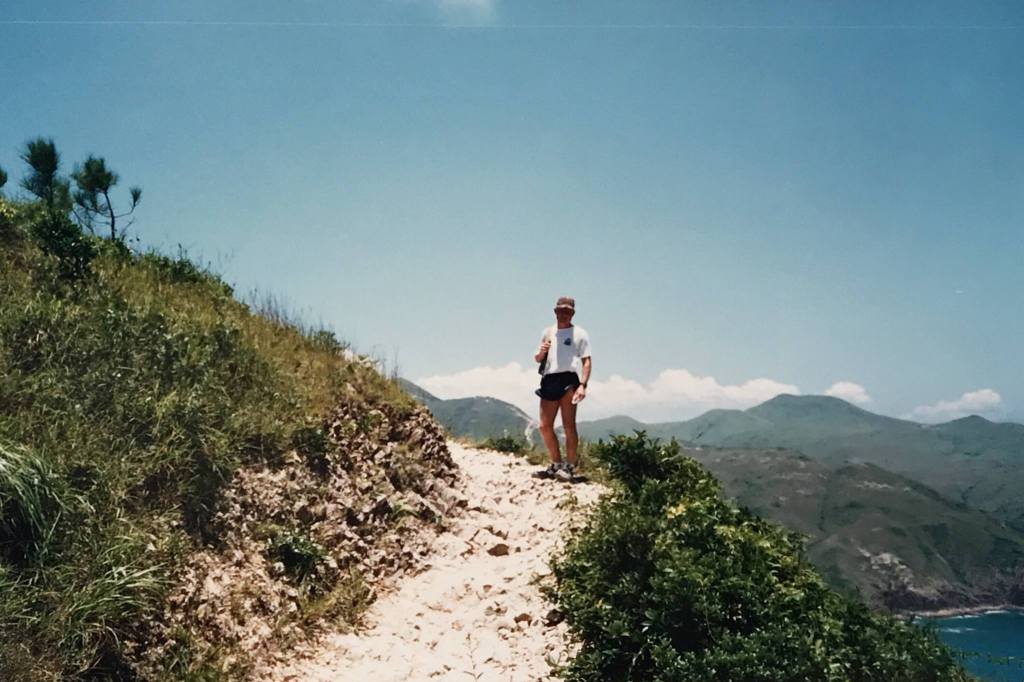

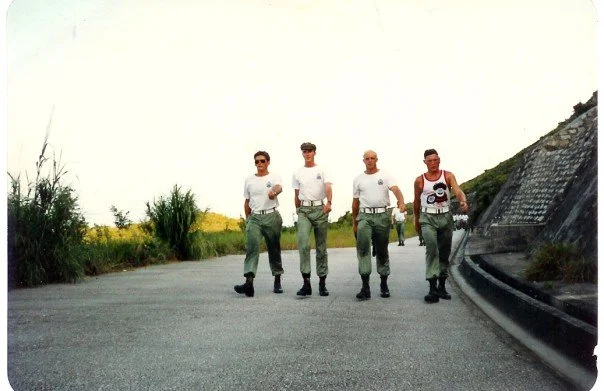
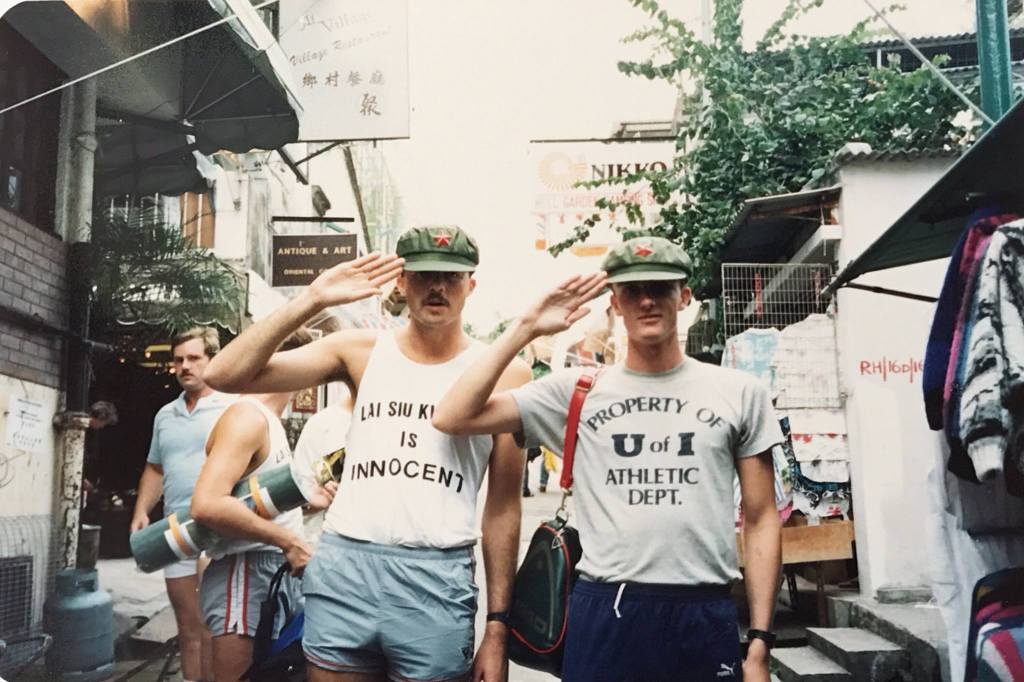
It wasn’t all fun and games, stage examinations were always a cause for stress. Local officers would work feverishly into the night, often in study groups memorising law and procedures, lesson notes and weapons parts. I also put in a lot of effort as memorising “stuff” and rote learning has never come easy to me.
For a week or so before examinations I would manage my time very precisely. Study session in my room with a fan and mosquito coil, or perhaps two burning away. Go for a run. Study a bit. Have dinner in the Mess. Study a bit. Reward myself with a beer or two in the Mess with my squad mates (many of whom would appear to have been at the bar since classes ended and yet still many managed to pass out in the end… some not). Then study a bit more and prepare and lay out kit for the next day.
Unlike Hendon where every night we diligently pressed our police uniforms with steam irons and slivers of cloth, brushed helmets and tunics to within an inch of their life and “bulled” our boots to a mirror like shine, in Hong Kong we had room boys (mostly twice our age) who took away our smelly sweat soaked kit at the end of the day and in the morning it was washed, pressed and on a hanger outside our rooms, our boots shined, polished and placed on a mat.
My PT T-shirts always seemed to smell of ammonia within seconds of putting them on. As a human being of a race evolved in a cool temperate climate, I spent nearly all my time at PTS, and indeed after I was posted to various units in Hong Kong soaked in sweat. I suffered terribly from rashes and acne and often wondered why I subjected my pink body to this tropical soup. Our local colleagues rarely sweated and used to remark what sweaty and smelly creature we Europeans were. For me, I was dripping wet from the moment I put on my uniform, except in the lovely seasons of autumn and the few weeks of winter when it was actually quite cool and we wore UK style dark blue winter uniforms and sometimes overcoats.
Recruit Police Constables (RPCs), who undertook a shorter training period than Inspectors, did not have it so lucky and spent as much time, if not more as I did at Hendon polishing, brushing and cleaning their kit, including bayonets that were affixed to old style Lee Enfield rifles for foot drill. They were always running around in small groups and always saluting at anything that moved, especially expatriates who they would assume were Inspectors as none of us were recruited at constable rank anymore. In the old days they were.
At Easter in 1987 after a few months training we were told we had about four days off and so several of us applied to leave the Colony and spend the short public holiday in Thailand.
Usually, the Kai Tak Convention is applied to such trips and that means “What goes on tour, stays on tour”. This is a sensible policy as it protects marriages, relationships, and reputations, not least incarceration. However this is my blog, time has gone by and if any wives are going to divorce us they would surely have done so by now.
As well as the usual rugby, cricket, football, hockey and “whatever sport you are into” trips, these were really an excuse for lads escaping from the missus and behaving badly on tour. Much like stag tours in England. Often social or casual sporting teams would go en masse, dressed in finest Hawaiian shirts (prizes for best parrots and pineapples), very short shorts, and a very well practiced drinking arm. Some rugby games were played against local and expatriate teams in places like Thailand, Philippines or wherever and the evening and wee small hours would be spent on pub crawls and ladies who “loved us long time”.
In April 1987 when five of us landed at Bangkok airport it was another quantum leap in our ongoing culture shock. Throughout my early life and time in the “Met” I never had any money and had never been anywhere except to Bognor to stay with my grandmother and a budget school trip to Brittany, in which I had no pocket money and spent the whole trip eating cabbage soup and being scolded for my poor French.
When I was in the Metropolitan police I was married at twenty and divorced by twenty one. I have a lovely beautiful daughter, Becky whom I was rarely allowed to see back then and she was the reason, if I am being honest, for the unsuited union with her mother. When it all went south, as it undoubtedly would, the former Mrs U employed a leftie north London lawyer that maintained “Maggie’s Boot Boyz” like me were the Enemy of the State and ate small children for breakfast. However, they were not too conflicted to take all my money for maintenance and relieve me of my very few possessions. After several years of hard work, all I had to show for it all was a rented TV, a settee that had been discarded in a skip and a Triumph Herald motorcar that usually rested on bricks or was towed around England by the AA Relay service. If I ever had a spare tenner my brother, Simon, who was in the Blues & Royal Household Calvary based at Knightsbridge Barracks, would suddenly appear, tell me how he was suffering from post traumatic stress from when he was blown up by the IRA in Hyde Park and that would be the last I saw of it. They say money doesn’t bring happiness, but its a damned sight better than the alternative!
So, this was my first real holiday and by gosh, what a holiday it was.
After a rowdy flight from Kai Tak airport and a surreal taxi ride across Bangkok we arrived at a pretty decent hotel in the heart of the city. I think it was the first proper hotel I had ever stayed in and it was all very exciting. Later, whilst having dinner in the hotel restaurant we were joined by five unsolicited hookers who sat under our dinning table and stayed there throughout our entire meal applying makeup and giggling. To this day I have no idea what it was all about and we left them to it and went off to explore the bright lights of Soi Cowboy, or wherever.
It was all very odd, bizarre and rather exciting. Being young, being with good friends, experiencing new things, having some money in your pocket, seeing the world, and with the prospect of an exciting life ahead was thoroughly exhilarating.
I can vaguely remember that our short time in Bangkok involved seeing elephants wandering down the streets, racing about in tut tuts, Thai boxing, drinking heavily, prostitutes, “Crying Game incidents” with ladyboys, eating spicy Tom Yam Kung and satays with peanut sauce, racing about in speed boats down canals, dancing, laughing and having fun.

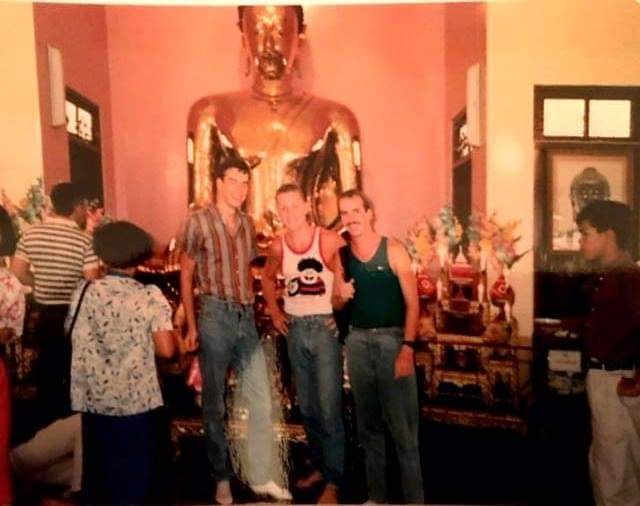
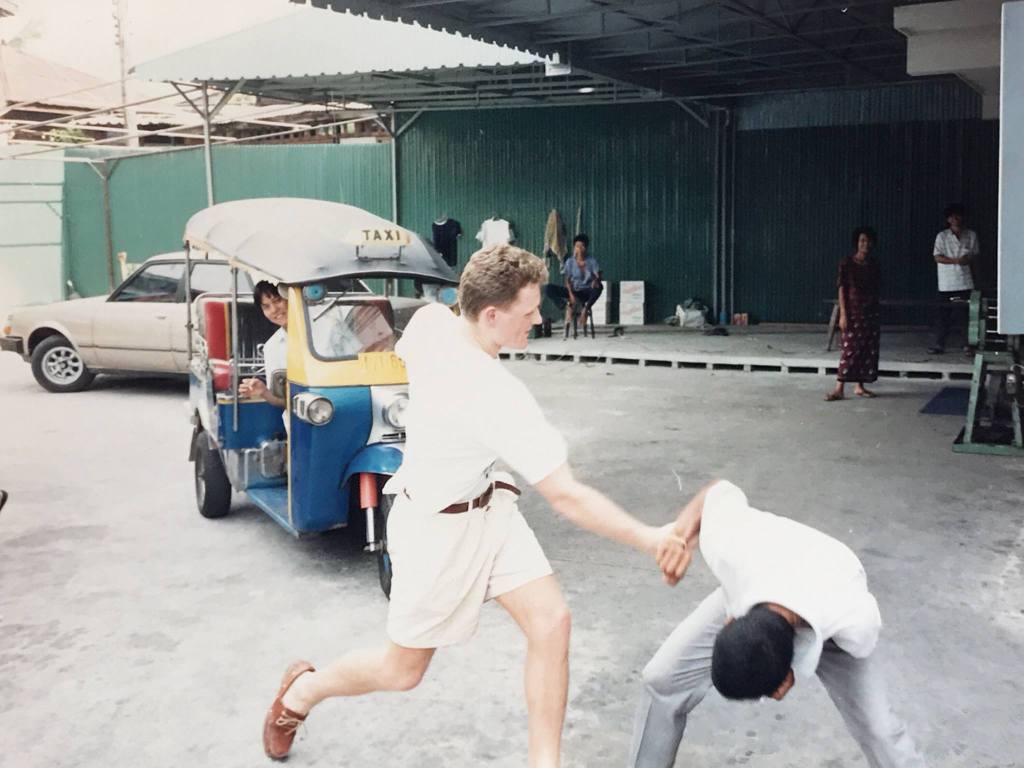
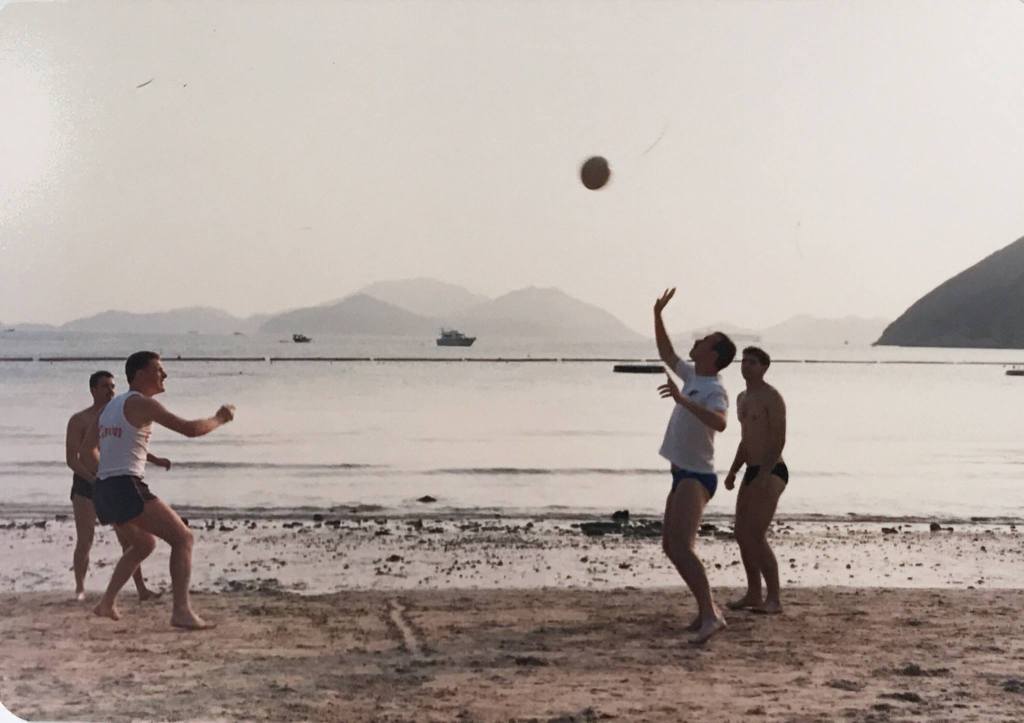
The next day we took another short flight and went to Phuket, which in 1987 was largely undeveloped with very few buildings over two stories in height. We stayed at a cheap and simple bungalow complex called Capricorn Bungalows, got closely followed about and stalked by grim hookers, and mostly escaped them by hiring mopeds and spending our days on deserted tropical paradise beaches where we messed about in the sea, relaxed in the shade under palm trees that were gently swishing in the fragrant breeze, had “proper” relaxing Thai massages, drank ice cold Singha beer, and ate papaya salad and super fresh seafood grilled by our own chef who appeared out of the jungle from nowhere and cooked for us throughout the day. Halcyon days, indeed.
As the sun set and the Thai sky turned from blue, through to yellow, orange, red and purple we would ride back to town and prepare for an evening of music, dancing, drinking and pretty girls, most of whom, if not all, wanted to relieve us of our money.
All too soon it was back on a plane to Hong Kong, the seeds of misadventure firmly sown.
Over the weekends the local PIs and RPCs all left PTS on Saturday afternoons to go home and came back on Sunday evenings and got back to studying for Monday morning examinations. That meant at the weekends after Saturday morning parade, PT lessons (usually a run or swimming) and perhaps some weapons training we expats had the training school largely to ourselves, with whoever was unfortunate enough to get “gated” over the weekend (confined to school and have to report to the Duty Officer every hour in full uniform).
We would often go off in small groups to explore Hong Kong, play sports, go shopping in Causeway Bay or Stanley, see girlfriends (if we had any, most of us did not until much later), go on junk trips, sun bathe on the nearby beaches of Deep Water Bay or Repulse Bay, and sometimes further afield to the beautiful beaches on Lantau Island or Sai Kung and get up to mischief in the bars and nightclubs of Tsim Sha Tsui, Wan Chai and Lan Kwai Fong.
Its strange to recall pre Internet days and how we kept in touch with family and friends back in England. I used to write letters often and back then we mostly used lightweight and reasonably cheap “aerograms” that folded in three, sold in the Officer’s Mess and had the postage included in the price. I remember we all loved receiving letters and these were handed out by our course instructors and we would often share the news from our respective homes. There was a public phone box that you could make overseas calls using a pre paid phone card and very occasionally we would receive overseas telephone calls and whoever heard the phone ring would run around the Mess and accommodation blocks looking for whoever it was for.
Most of us came from England, Scotland, Wales and both Northern and Southern Ireland with a few officers coming from Commonwealth Countries like Australia, New Zealand, Canada or South Africa. However there were a few expatriate officers who were actually born or raised in Hong Kong, such as Dave, a fellow Metropolitan Police Officer whose father was a Superintendent at the training school. Also, Ian, who was in an intake behind us, and his father was a Squadron Leader in the Royal Auxiliary Air Force and used to fly us around on training exercises in helicopters. There were a couple of guys who had been in the French Foreign Legion and one I knew who previously served in the Bermuda Police.
We would have to perform night shift “Duty Officer” from time to time that meant we practiced for the first job everyone of us would get when we got to our police stations. It involved learning how to use radios, call signs, RT procedure, filling in a log book (Occurrence book) and reporting to the CDMI, Mr Fullerton in the morning. This debrief usually involved being shouted at very loudly and receiving a de facto “bollocking”. The Occurrence book was scrutinised carefully for any errors, and given Mr Fullerton was a former British Army senior NCO with attention to detail habits like writing out long hand using a ruler, mistakes would always be found.
During one of these verbal assaults I was standing to attention, bolt upright in the CDMI’s office, eyes fixed on his cap badge, not moving an inch, when in the corner of my eye I noticed a change in light and then heard a thud. I watched carefully as Mr Fullerton’s eye line followed the source of the thud to the floor and returned to stare at me as if daring me to move. I then said, “Sir, permission to pick Inspector Wong off the floor”. The CDMI observed me closely and a faint smile crossed his face, and he then shouted, “Peeeer Mission Geer RRanted” in his drill square Scottish accent and I proceeded to heave the hapless Inspector Wong, who had evidently fainted out of sheer terror into the hallway and into the recovery position, from where he dozily emerged, muttering, “Sorry Sir, Sorry Sir” and then literally ran away.
Sadly, Mr Fullerton has since parted for the big drill square in the sky, but he was always fair to me at training school and on the occasions we met after I passed out he was always friendly and often chatted to me, mostly about his son, whom he told me joined the Metropolitan Police and was immensely proud of.
Training at PTS continued, with us ploughing through criminal law, police procedures, weapons training, foot drill, internal security training, physical training, first aid, tactical training and leadership. We were all getting fit with all the PT, with me getting seriously into running, and for a brief year or so having the record for the Brick Hill run, which involved running up steep steps underneath the Ocean Park cable car, running along the path at the top of the hill, running back down again, along Aberdeen Harbour and entering PTS from the Wong Chuk Hang entrance.
I can’t remember my time, although I was getting about 7 minutes 30 seconds on my regular 1.5 mile AFT runs (getting to my record of 7 minutes, 9 seconds at Police Tactical Unit a year or so later) and I usually came first on the long 6-12 kilometre runs, against stiff competition from Mike and a few racing snake RPCs.
All police officers have to pass the Annual Fitness Test that involves, among various exercises like sit ups, press ups, interval running, standing jump, etc., a timed 1.5 mile run and this timed run continues every year throughout our service with increasing time allowance given as we got older. I have witnessed some spectacular cheating over the years from some police officers, especially detectives from CID, married female officer, and senior NCOs whose only physical activities were inclined towards Mahjong and gambling. Having said that the RHKP really encouraged running and fitness and there were many races and competitions to enter. The Nine Dragons race over the peaks of Kowloon, the Dowman road race at High Island Reservoir, and the Sedan Chair race on the Peak, to name a few.
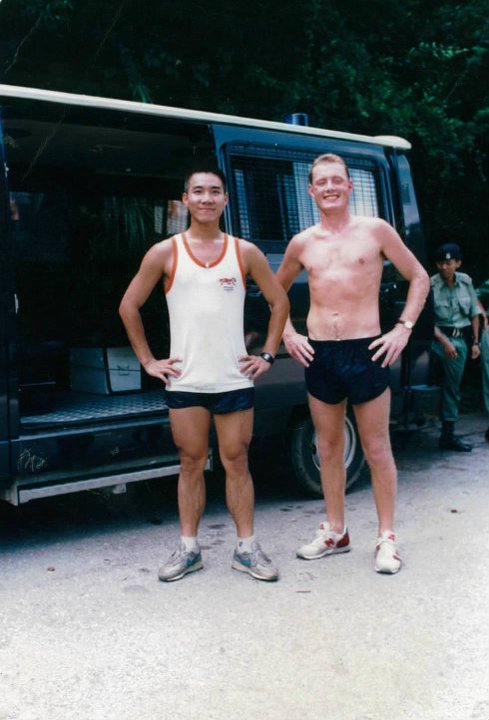
At PTS, I made my time on the Brick Hill run on the down hill stage where I used to dive from the top of several steps, grab the hand rails half way down and swing onto the flat path below without having touched any of the steps. It is certainly not a manoeuvre that features in my middle age fitness regime.
I also made up for my appalling cricket and rugby ability by joining all the many opportunities to play sports. Unlike nearly all my fellow expatriate squad mates I had had a bad start as far as team sports went, with the exception of cross country running and boxing which can hardly be described as “team sports”.
Many people assume that because I was named “Rupert” and have a sort of “received” English accent that I came from a privileged middle class background. In fact, I did come from an average lower middle class family until the age of 9 or 10 years old when my parents moved from Burton Upon Trent to “the village of the damned” in the Staffordshire countryside, immediately got divorced, my father moved away, and my brother, two sisters and I were plunged into real poverty, my mother coming from a background that refused welfare and handouts, and so we went without.
I remember my mother wore the same clothes throughout my teenage years and worked tirelessly as a barmaid and pub cook to support us, sacrificing her own life and happiness so that there was always food on the table. Demands by her four children for footballs, cricket bats, bicycles, sports kit, school trips and uniforms must have been a purgatory for her. We all knew she was under great pressure and so we went without. That is until our early teens, when all of us found part time jobs that would fund the things most kids, and indeed our own kids, take for granted .
I fell off the grid from 11 years old until perhaps 13 or 14 years old and often skipped school. Formative years in any child’s development. It was a horrific time. I got bullied by the village kids, bullied at school, bashed by my mother’s boyfriend who also threatened to do the same to my father if he ever came round to see us, and I often received canings at school. I once received a public caning in the assembly hall for escaping from a religious education lesson where I told the teacher it was all “made up” and spent the rest of the day up a tree in the school grounds with all the students cheering and waving at me from the classrooms and furious teachers at the base of the tree trying to make me come down. As a master tree climber of note, it was a tree only I and perhaps a couple of other kids could climb.
Alas, I waited for several hours until school was over and everyone had gone, slunk down the tree, sidestepped the school caretaker who was waiting in vain to get me, and walked seven miles from the school in Uttoxeter to my home in the village of Abbots Bromley. Inevitably, the next day a reception party of teachers intercepted me as I stepped off the school bus and I was hauled out for my public shaming in the form of twelve of the best, administered by the head with a cane.
I can say I was caned, slippered, given the clothes brush, given the belt, whacked, slapped and even punched and beaten by various adults throughout my childhood. I didn’t like it, but once it was over it was over and sadly it sort of becomes the norm and you get used to it. Also, being small and immature for my age when others were going through puberty, and being called “Rupert” with a so called posh southern accent meant I was often in fights, which I usually lost… for a while at least.
This caning by teachers and bullying because I was different did little to bring me back to Jesus and I found solace by escaping from school to go on my various adventures and walkabouts. As an 11, 12 and 13 year old youth, instead of being at school I would often escape, spending my time swimming in reservoirs, drifting for miles down rivers all day, hitch-hiking to Dovedale or the Peak District, exploring the forests and hidden woods in Cannock Chase, sneaking into public swimming baths or Alton Towers where I would wander around the beautiful gardens (before it became a huge amusement park). On occasions these adventures were with my best friend, another “outsider” of my own age called Joe, who would go on to own a much admired Yamaha FS1E, become a soldier in the special forces, a North Sea deep sea diver and who sadly committed suicide on his 30th birthday.
Before all this, my earlier life was actually pretty happy, although quite strict by modern standards. My parents were well educated from good public schools, and we were brought up as Roman Catholics. My father was a manager at the tyre company, Pirelli and my mother was a housewife. I went to a superb Catholic primary school in Burton upon Trent and was taught by truly inspirational teachers, served at Mass as an alter boy, did reasonably well academically, was extremely adventurous and curious about everything, and more importantly I was a confident young fellow.
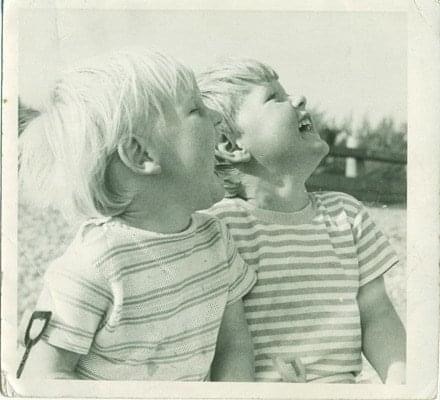
From 11 years old everything changed. Despite my father, who went to Ampleforth College and my mother, who went to a Catholic Covent in Dorking going completely off the Holy rails, I still went to Mass for a while, largely because my friend Joe’s family were also Catholics and encouraged me to do so. That was, of course, until the fateful day a few coins I earned washing cars was relieved from me and donated to Mother Teresa. That incident and of course my parents unholy behaviour was the end of Catholicism, and indeed all religion and adult guff for me. To borrow sentiment, if not the exact the words, from the late Christopher Hitchens, that Bitch of Calcutta got nothing from me again.
My form of escape and income in those days was working on a dairy farm about three miles from where we lived. At 12 years old, I decided to earn my own money and knocked on the doors of every farm I could think of. I was turned away by every single one, except by Graham and Jean Whirledge, who allowed me to spend weekends, holidays, after school, and occasionally when I should be at school working for 50p an hour on their Staffordshire dairy farm. Graham was quite strict, had an explosive temper, but he was also very fair and extremely kind. I found out much later he and his wife, Jean knew about all the beatings and misery at home and I suppose in a way they helped bring me up, and for that I am eternally grateful.
The reality was, I was just a young lad and pretty useless, but they persevered with me until by the time I was 14 years old I could pretty much do everything an adult farm labourer could do and could hold my own. I did everything from scraping out shit, feeding the animals, bailing straw and hay, silage making, milking, delivering calves, and tractor work down the fields. The English outdoors, its four seasons and the physical nature of farming toughened me up, made me quite independent and reinforced my love for nature, wildlife and the outdoors.
If I had not worked on the farm I would have had nothing. However, this farm work provided me with not just money, but some restoration of confidence and self esteem. I also became quite fit and I think it helped me develop the stamina, self discipline and respect for money I have today.
Anyway, before I started earning my own money, my brother and I could not afford all the required school uniform, nor any of the various bits of kit required for all the different sports and so PT lessons were a constant exercise in humiliation and shame. At my school any kids who had forgotten their kit, or just didn’t have any (like my brother and I) had to fish about in a large cardboard box before lessons for lost and discarded PT kit to wear for the gym and sports lessons and then hand it back after the lesson had finished, just so the the misery and shame was repeated every single lesson.
For many school terms my brother and I stood out from the others, not just because of the Monday morning public shaming of being named as eligible for free school meals, but visibly in scruffy uniform, mismatched and ill fitting PT kit, and the ultimate in humiliation having to do PT in your underwear. This resulted in both of us skipping either PT lessons or school entirely to avoid embarrassment, bullying, being made fun of by other students, and admonishment from teachers (as if either of us could do anything about it).
The other result of all this, and the point of this long sad old story, is that we really missed out on learning to play team sports, especially football, rugby and cricket that required boots, shirts, cricket whites and importantly someone who gave a shit with a car to take you to and from practices and games. My brother just escaped… mostly to his friend’s , farm and later joined the Junior Leaders Regiments of the British Army at 15 years old.
By the time I had my own money from working on the farm and when things had improved at home, my days of school sports was nearly over. I did eventually buy myself some proper school uniform, football boots and cricket whites and thoroughly enjoyed any opportunity to play, but by the fifth form I was immersed in catching up the missed classwork and studying to get my “O” levels.
At the same time I also discovered music that would have me hitchhiking all over the country, or later when I was 16 years old riding my 50 cc Batavus Mk4S moped, to see bands like Joy Division, The Cure, Bauhaus, Echo and the Bunnymen, Theatre of Hate, Swell Maps, and other late seventies new wave and punk bands. My desire to fit in when I was 12 years old was soon replaced by a rebellious streak at 15 years old not to.
So, when I arrived at PTS less than a decade later and was asked which sports I played, I optimistically informed the instructors I was an accomplished light heavyweight boxer, could swim very well and was quite a good runner.
I was disappointed that this, at least initially, was not particularly well received by my course instructors, nor by the rugby and cricket types who were at the training school. I got the initial impression that many RHKP officers did not think much of boxing, and the fact I did not play cricket or rugby didn’t help, not that the local Chinese officers could play either, preferring basketball, ping pong, watching football and in fact, not doing anything sporty at all if they could help it. I know looking back that I was being overly sensitive about all this, but psychological scars can run deep and last long.
Unlike the RHKP, the Metropolitan police highly respected boxing, and novice boxers like me received a lot of encouragement and support. We got time off to train, great kit, excellent facilities, we had brilliant trainers and coaches (some being former professional boxers and Olympians) and we got to compete in prestigious events like the LaFone Cup boxing competition.
I took to boxing like a duck to water, thoroughly enjoyed the camaraderie, the tough training, and especially the fights themselves. Boxing also changed my physique dramatically and I became very fit indeed, and I think have remained reasonably fit with a habit for physical fitness and training ever since.
Those years of childhood bullying, mental trauma and being treated badly at school is also a reason why I have a very low threshold for being treated unfairly or unjustly, or if I perceive I am being so. To be honest, this line in the sand has served me well, but it is also a reason for my lack of tolerance and notoriously bad temper, especially during my twenties.
Despite being a fairly accomplished boxer and having studied some martial arts self defence disciplines such as Aikido and Krav Maga, I have rarely reverted to physical violence, although I am told by everyone that my vicious bark can be quite alarming. All that aside, I will not tolerate bullying (physical or intellectual), cheating, spitefulness, nor injustice. If the red mist comes down I remain unapologetic because at my core I have a strong sense of right and wrong. I am proud my moral compass always points in the right direction, even though on occasion doing so ruffles feathers and makes me unpopular. I have messed up in life many times, been carelessness, ignorant, and misplaced trust with the wrong people, but never down to lack of integrity or dishonesty.
I would dearly liked to have been good at football, cricket, rugby, or any team sport really, but I think you need to start young and receive good coaching to be really good. I know because my other half, Fanny, was a professional volleyball player and played for Shanghai and China. I am always amazed and proud how good she is, even now, but I know she started at 8 years old, had the right mental attitude, trained exceptionally hard, developed an athlete’s physique and was coached and mentored by the very best.
At PTS we all had to pass life saving examinations, much as we all had to do in the Metropolitan police. I was always a very good swimmer having taught myself to swim at Burton Upon Trent Swimming baths when I was six or seven years old. I spent an enormous amount of time throughout my childhood in swimming pools, rivers, lakes and the sea and was very comfortable, being able to swim many miles and wallow about in any condition all year round. Swimming in the English seas in winter, if I had the opportunity, was enjoyable and fun to me, although nowadays its safe to say you won’t find me in the English sea anytime soon.
I was a little surprised, however, that a few of the local Chinese officers were unable to swim when they first joined the police, and some not very well, but due to the hard work of all the PTIs everyone not only learned to swim, but passed the life saving and first aid examinations before passing out.
All Inspectors had to complete “leadership camp”, that consisted of a week of exercises in the great outdoors and designed to consolidate and test the theory and training we had learned so far. By and large the local Chinese dreaded leadership camp for reasons I already mentioned, but for expat officers it was a week of larking about, tomfoolery and drinking beer from 7 Up cans.
We were helicoptered into Sai Kung Country Park and stayed in barracks at the Police Adventure Training Centre near High Island Reservoir. In addition to all the leadership exercises, we had to prepare and cook our own food, and I remember our DMI getting annoyed because our western style chicken curry didn’t include every bit of the chicken, and there was a bit of a fracas when Mr Cheung retrieved the beaks, squeaks and innards from the bin and plopped them into the vat of curry we were preparing. Our expat revolt was quickly subdued when we tasted the curry and it was actually, alright.
I remember being quite honoured and pleased with myself to be chosen to lead an exercise in front of the Commissioner of Police and several senior ranking officers who flew out into the wilds of the New Territories from Police Headquarters to observe our training. In front of the entire top brass, including the Commandant of the training school, I gave a good show of consulting my map and compass, gave a “leadership like” briefing, pointed a lot and then proceeded to march my team off in completely the wrong direction.
Having been halted in my tracks by the “directing staff” who made it abundantly clear I had “fucked up”, they warned me, ever so nicely, of the repercussions of “fucking it up, again”. With all the top brass giving me a “standards aren’t what they used to be” look, I “about turned” my team, ignored a hissed appraisal of “idiot” from a group of course instructors, and as confidently as my acting skills allowed, marched back passed the entire entourage, nodding to Mr Raymond Anning (Commissioner of Police) and grinning like an imbecile.
I also remember an exciting night time exercise, ostensibly to raid a drugs transaction in a small village, where we approached the site in RAF helicopters, much like the Ride of the Valkyries scene in the movie, “Apocalypse Now”. The phenomenally skilful RAF pilots flew a few feet off the ground at night through the valleys and performed gut wrenching manoeuvres we all thought impossible in a helicopter. Fun? Of course it was. Dinner? Not much of it left.
In the senior stage we had to do a week of Internal Security training where Probationary Inspectors formed up with Recruit Police Constables and trained together to perform riot drills and public order exercises. It was an early taste of what to expect when a year of so later many of us would transfer to Police Tactical Unit. Under my first ever command my band of brothers and I were deemed the best platoon and were awarded a rather splendid trophy.
It was also a time when we took our final examinations and I think we all passed our Standard I Inspectors’ examination, myself with fairly decent grades in all papers. I was especially delighted when it was announced I had been awarded “Baton of Honour” as the best Inspector on completion of our training. It was hard work, but I thoroughly enjoyed PTS and count it among some of the best days of my life.
Before the passing out parade, we all had a week of attachment to the police station we were to be posted to after training. I had initially wanted to go to Marine Region and learn how to command a police launch and patrol the extensive waters and islands of Hong Kong. My course instructor, Ken told me this was not possible and I had to apply for a proper job! I replied, “OK, I want to go to Tsim Sha Tsui” which is an exciting and busy division on the southern tip of Kowloon and full of tourists, shops, nightclubs, hotels, and the notorious Sun Yee On Triads. Alas, I didn’t get that either and was instead posted to Kowloon City Division, of “Walled City” fame near Kai Tak Airport.
Stewart, Simon and Ben did get posted to Marine divisions and I have to say their shift pattern of two days “on” (48 hours) and five days “off” sounded a lot more appealing than my 6 days “on” (60 hours) and just one day “off” a week. So did charging around in speed boats and learning how to skipper a Marine launch. In fact, if you want to learn about Marine police read a book called “Small Band of Men” by my former colleague, Les Bird. An excellent read, very insightful and funny. https://www.amazon.co.uk/Small-Band-Men-marine-police-ebook/dp/B07YYLXBPJ
My attachment to Kowloon City turned out to be both interesting and a little unsettling. I found a Hong Kong police station to be very different to a London police station. One of the big differences, apart from all the discipline and the paramilitary nature of policing in Hong Kong, was that it seemed to me that police officers did not exercise much initiative and were not trusted to use any discretion. Duties were dominated by being told what to do under strict supervision and with the threat of being disciplined (defaulted) if they didn’t. For instance, Hong Kong policemen to this day are required to sign visiting books positioned around their beat to make sure they actually go on patrol. It seemed signing these archaic books was considered a satisfactory indicator of “doing your job”. Protecting life and property, keeping law and order, and preserving the peace? More like answers in a sergeant or inspector’s exam than primary aims of policing.
Compared to what I was used to in London, I found the paperwork, exhibit handling, statement taking, documentation and procedures laborious, repetitive and old fashioned. Everything was written out over and over again in occurrence books, ledgers, notebooks, and reports. There were dozens and dozens of forms, files, loose minutes and endless memos. Bagging up exhibits required dozens of people with PhDs in origami and stapling. The general interviewing skill of many of my colleagues was poor, and I am ashamed to say the tactic of thumping confessions out of prisoners with a telephone directory and a heavy object all too frequent. The few of us who were former police officers from the UK thought all of this was shameful, degrading and not least, damned right illegal. The majority of Inspectors who joined the force from other professions or straight from college, I suspect, didn’t know any better.
As an expatriate officer at Kowloon City I found it a lonely experience. I was largely ignored and the only other foreigner in the police station was the Divisional Commander, called Paul Deal who was a delightful man and a wonderful boss. If it was not for Superintendent Deal and his kindness and support I think I would have resigned.
The biggest draw back for an expatriate Inspector was our inability to speak and understand Cantonese very well, or at least in the early years, and I found this frustrating and a bit embarrassing.
In later years I came to understand the value and importance of expatriate officers in the Hong Kong police force. We were not really policemen, we were managers and leaders of policemen and brought many useful attributes and value to the task of policing an international and cosmopolitan city like Hong Kong. Our ignorance and perhaps detachment from the nuances of Chinese culture and language was often what defined our advantage because we did not get sucked into the quagmire of politics, superstition and little cliques. I have heard from many junior officers that they preferred working for expatriate officers because we were considered fair, impartial and professional, and maybe because we hadn’t a clue what was really going on. Of course, as we progressed through our careers expatriate officers like me would integrate more, speak better Cantonese, and become more like local Chinese in our outlook and thinking. Conversely, many long serving local officers embraced more western ways and become more like expatriates.
Anyway, on the second day of my attachment I was patrolling alone down a busy street in To Kwa Wan, taking in all the unusual sights, noises and smells when I heard a call on my radio and recognised the word, “da gip” meaning robbery and also recognised the Cantonese name of the road and the street number. As luck would have it I was standing underneath a road sign of the same name and quickly found the location of the robbery, which happened to be a restaurant.
As I peered inside I could see two people wrestling each other on the floor, engaged in a frantic struggle. Not unaccustomed to jumping into a fight I rushed into the restaurant, shouted “ging chaat, mo yuk” (meaning, Police, Stop) and being unable to distinguish robber from victim pulled both apart and had them spread eagled onto the floor with me on top of both of them.
Within a few minutes two Police Constables arrived and assisted me to identify who was who and arrest the villain. A red tab Constable (a red tab under the RHKP letters on his epaulette denoting a Constable who can speak English or has passed the equivalent of GCE “O” English) said he would take the arrest and so my real part in the arrest of the robber was erased from history.
This happened to me several times in the future, most notably in the early 1990s when I arrested an armed goldsmith robber when I was Platoon Commander in the Emergency Unit of Kowloon West as the robber was making his getaway at Hung Hong Ferry Pier. After what was quite an ordeal, that I will describe in a subsequent chapter, I arrested the robber and handed him over to one of my PCs who received a Commissioner’s Commendation for my efforts!
You’re welcome!
During the same week of attachment and again whilst out on my own I saw a uniform sergeant I recognised from the division, and who was supposed to be on duty, stripped off to the waist with his cap, uniform shirt, Sam Brown, revolver and radio lying on a stool and working in a hot and steamy “dai pai dong” (local restaurant) he clearly had a vested interest in. I didn’t need to pour over Police General Orders to know this was a serious breach of discipline, not least the unattended firearm. I hadn’t taken up command of a patrol sub-unit yet as I was on attachment and so I mentioned it to a local Inspector when I returned to the police station and was told in no uncertain terms to “forget what I saw” and not to cause trouble.
I was often told I didn’t understand Hong Kong during that brief attachment, but I think I was starting to.
On the morning of the 14 November 1987, together with my colleagues, I passed out of the training school in front of my mother and her partner who flew out to Hong Kong from England for the occasion. It was an especially proud moment for me and my family, as indeed I am sure it was for my squad mates and their own friends and families.
So, that was it. We were now officially unleashed onto the Hong Kong general public.
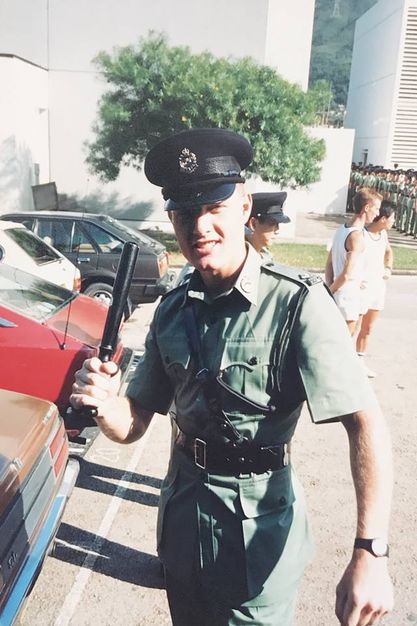
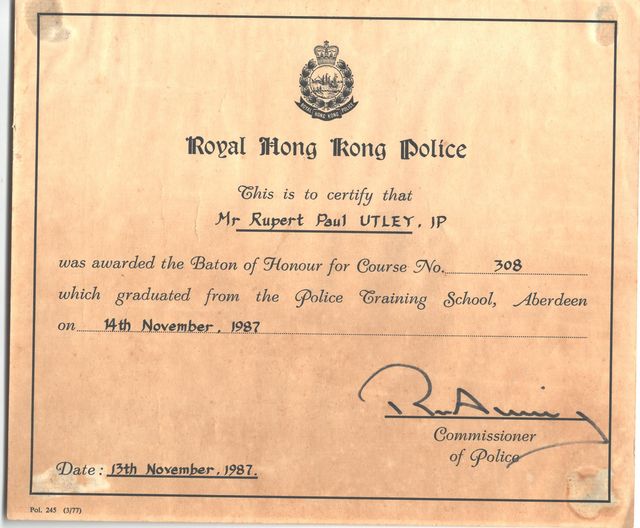
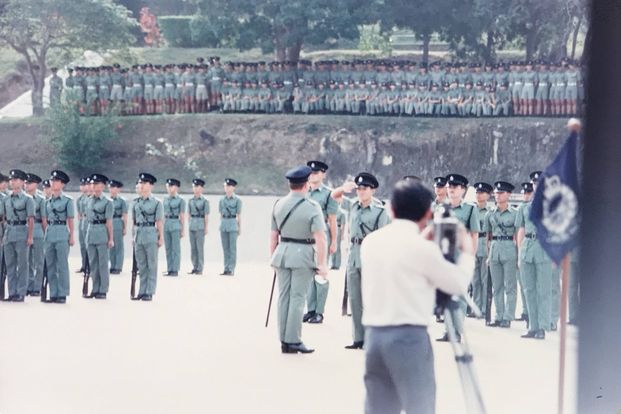
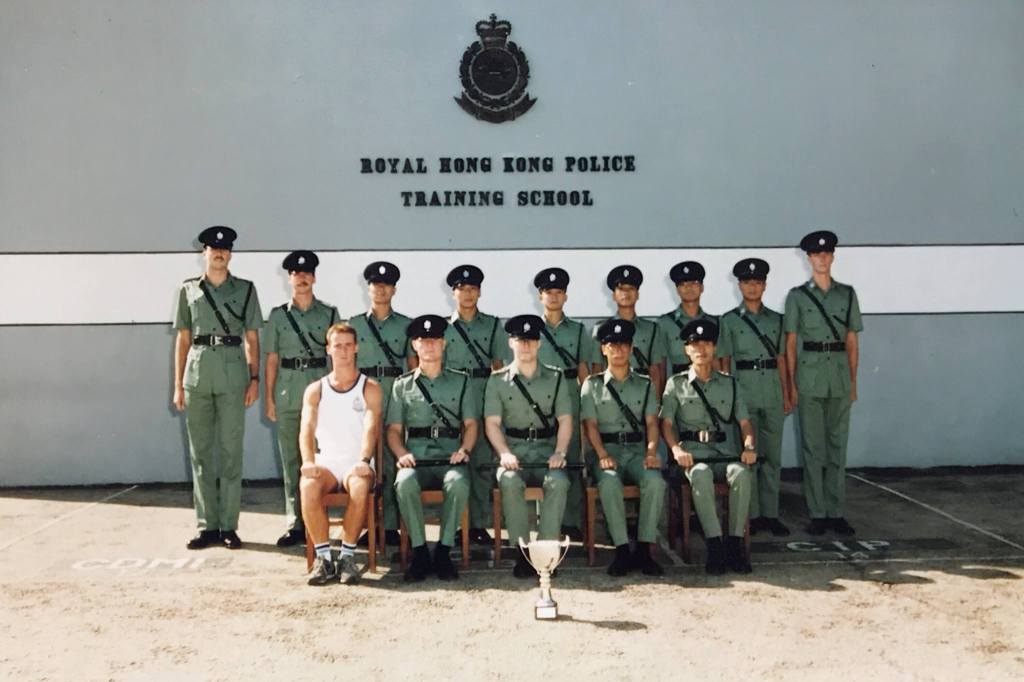
Next…..Chapter 2 – One Pip Bomban
….
Hi Rupert, (please forgive if this is a repost as i’m not sure if the original one went through)
Every so often I put my Dads name in to google to see if I can find any little tidbits and stories that might be floating out there in the ether. I was pleasently surprised to stumble across your Blog.
My name is Nick Deal and Paul Deal was my father. It has been 22 years since he passed away in Queen Mary hospital after a year battling pancreatic cancer.
In cynical times, it always gives me great joy and inspiration to be reminded of what a rare and wonderful man my father was, and what an inspiration he was to others. Whatever converations you may have had with my dad
(likely in the KC station Mess at some point) that helped drive you forward in your career, were echoed even in his final months when he shared a hospital ward with another fellow officer Mark Sharp.
https://www.police.gov.hk/offbeat/703/051_e.htm
I look forward to taking the time to read through your blog, I’ve already seen some familiar names. Dick Tudor and his family formed part of our core friendship circle and my mum sees them regularly.
I can tell you that is post as DVC KC was the highlight of his carrer and he was at his happiest when leading young men and women of the police force. I’m happy you knew him in that time. He had your guys back.
Thank you so much for the memory.
I have a great photo of him in front of the walled city I can send if you’d like.
Very good story.